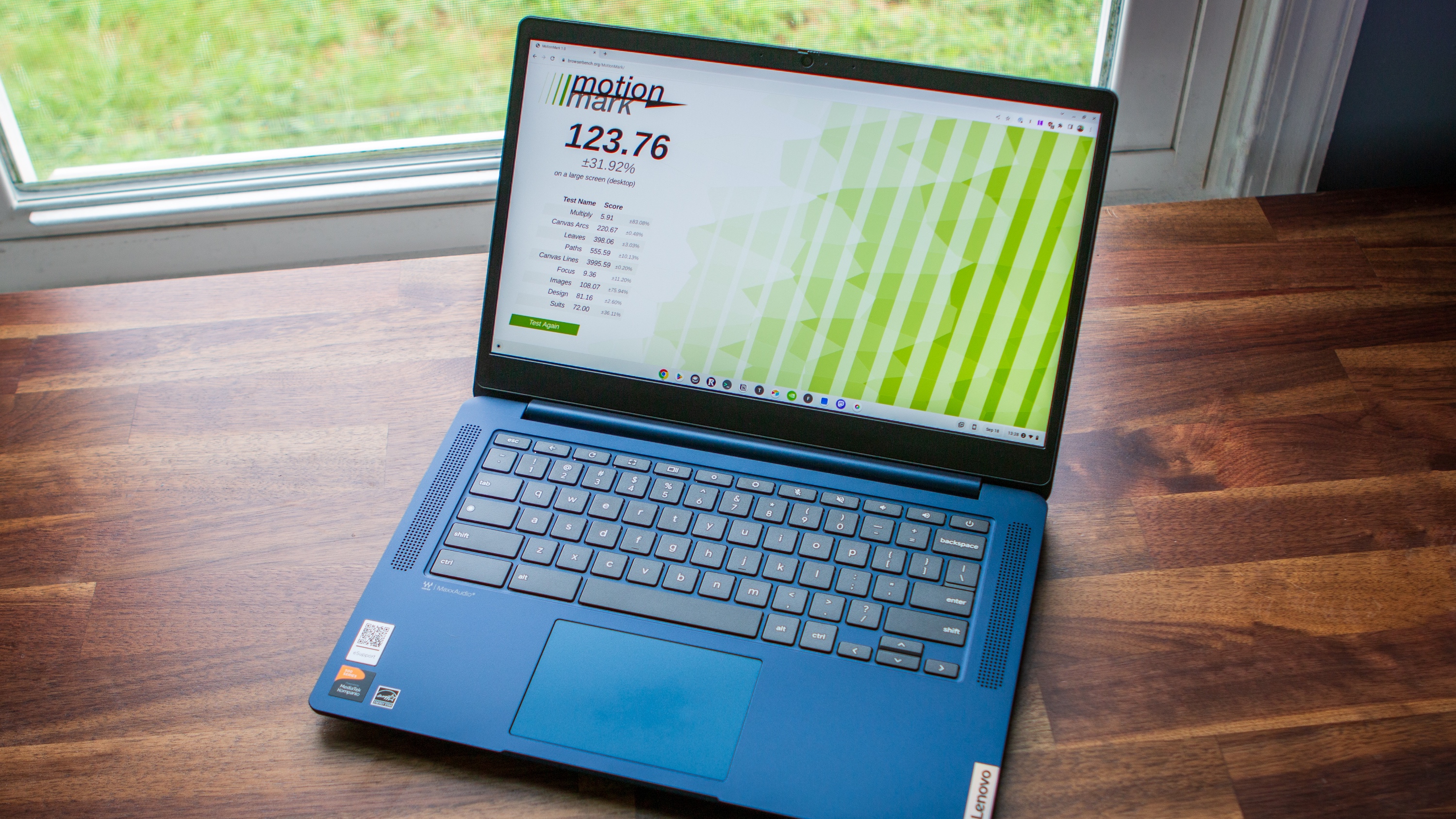Meta Quest 3S hands-on: Going all-in on affordable VR
The Meta Quest 3S is a more affordable Quest 3 with Batman Arkham Shadow bundled in.
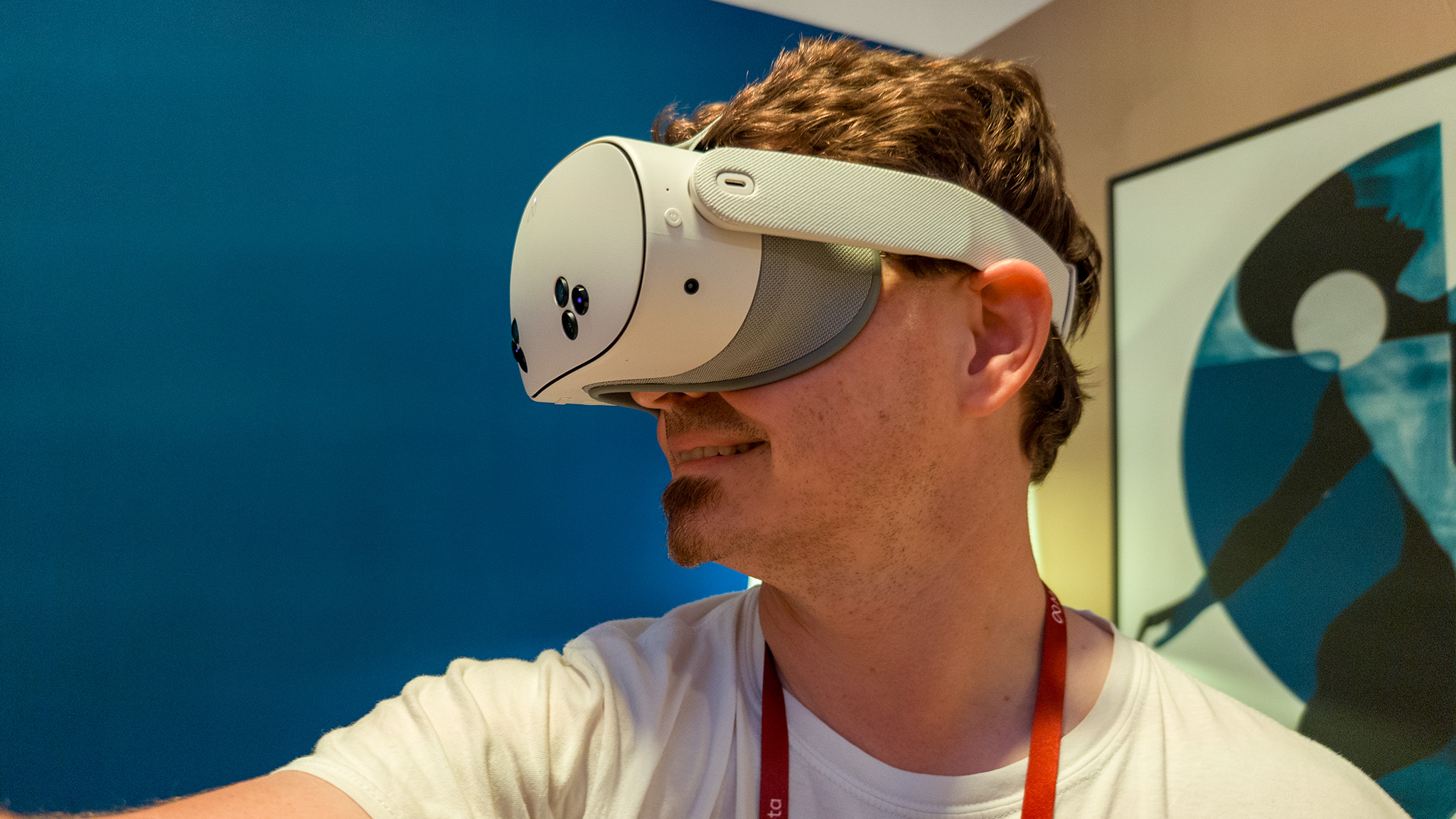
When the Meta Quest 3 launced last year, it felt like the ideal next-generation upgrade from its predecessor. But while the improved lenses, processing power, sleeker form factor, and mixed reality capabilities have been amazing, the $500 price was difficult for many people to stomach.
Queue the Meta Quest 3s, a new headset from Meta that's designed to deliver the next-generation graphics at a reduced price tag. It's an impressive $200 less than the regular Quest 3, putting it in real reach of people this Holiday season.
In a way, Meta's new strategy is similar to Microsoft's with the Xbox Series S and Xbox Series X by offering a $300 and $500 entry for gamers. Thankfully, it fixes the one big problem with Microsoft's strategy: both headsets have the same processor, helping to ensure that *all* games built for the Quest 3 work on the Quest 3s without developers having to visually downgrade things for the cheaper system, unlike the conundrum developers have to go through with the underpowered Xbox Series S.
I got hands-on time with the new Quest 3s just before Meta Connect 2024 in California, and I came away impressed with what Meta has been able to offer while keeping the price at a surprisingly affordable level.
Meta Quest 3S: Price and availability
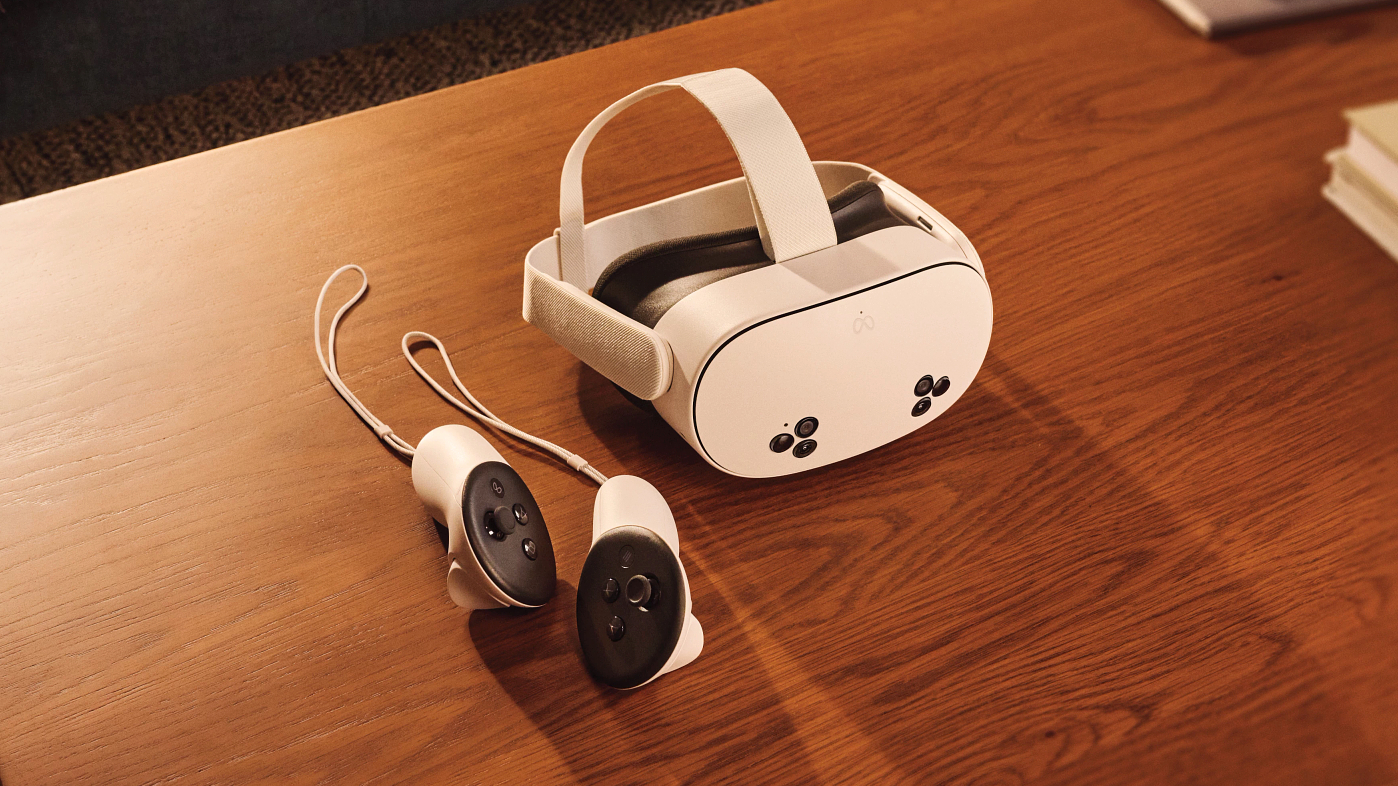
The Meta Quest 3S retails for $299 for the model with 128GB of storage. The $399 Meta Quest 3S upgrades the storage amount to 256GB but includes all the same hardware, so you're just paying more for extra storage.
Meta also runs a "play now, pay later" program that'll get you the Meta Quest 3 family headset, 24-month subscription to Meta Quest Plus, and Meta warranty plus coverage
- Quest 3S (128GB): $19.99 USD / month
- Quest 3S (256GB): $24.99 USD / month
- Quest 3 (512GB): $29.99 USD / month
Both models include Batman Arkham Shadow for free when you buy a headset before April 2025. This is similar to how the company launched the Meta Quest 3 with Asgard's Wrath 2 bundled in last year. Batman Arkham Shadow will be available on October 22.
Get the latest news from Android Central, your trusted companion in the world of Android
Additionally, all Meta Quest 3 and Quest 3S buyers will get three months of Meta Quest Plus for free, giving them access to a bunch of great games right off the bat.
You can preorder a Meta Quest 3S right now, and the headset officially launches on October 15, 2024 at all major retail outlets including places like Amazon, Best Buy, GameStop, Walmart, Target, and more. Meta's "Play now, pay later" program is only available at Meta.com.
Meta Quest 3S: Hardware and design
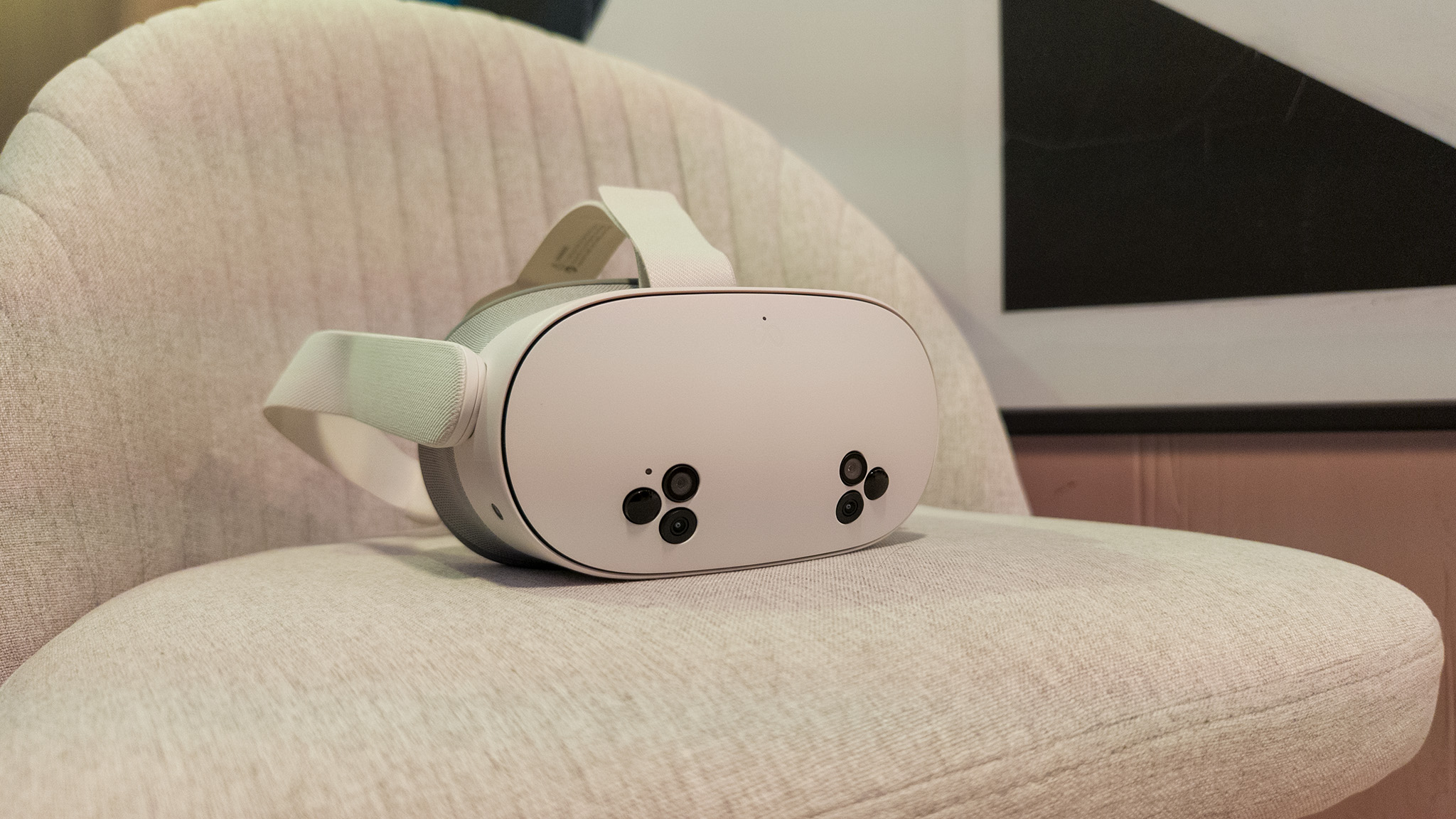
The Meta Quest 3s features a new hardware design that looks somewhere between an Oculus Go and the Oculus Quest 2. It's 20% smaller than a Quest 2—73.9mm vs 93.1mm—but bigger than the Quest 3's more svelte 62.3mm profile. The main reason is because Quest 3S uses the same Fresnel lenses from the Quest 2. Those lenses are larger and require more space than the pancake lenses in the Quest 3.
In fact, the display inside Quest 3S is identical to the Quest 2, packing in dual 1832 x 1920 resolution panels. Comparatively, the Quest 3 sports dual 2064 x 2208 resolution panels, so while Quest 3 is higher resolution, it's not orders of magnitude higher.
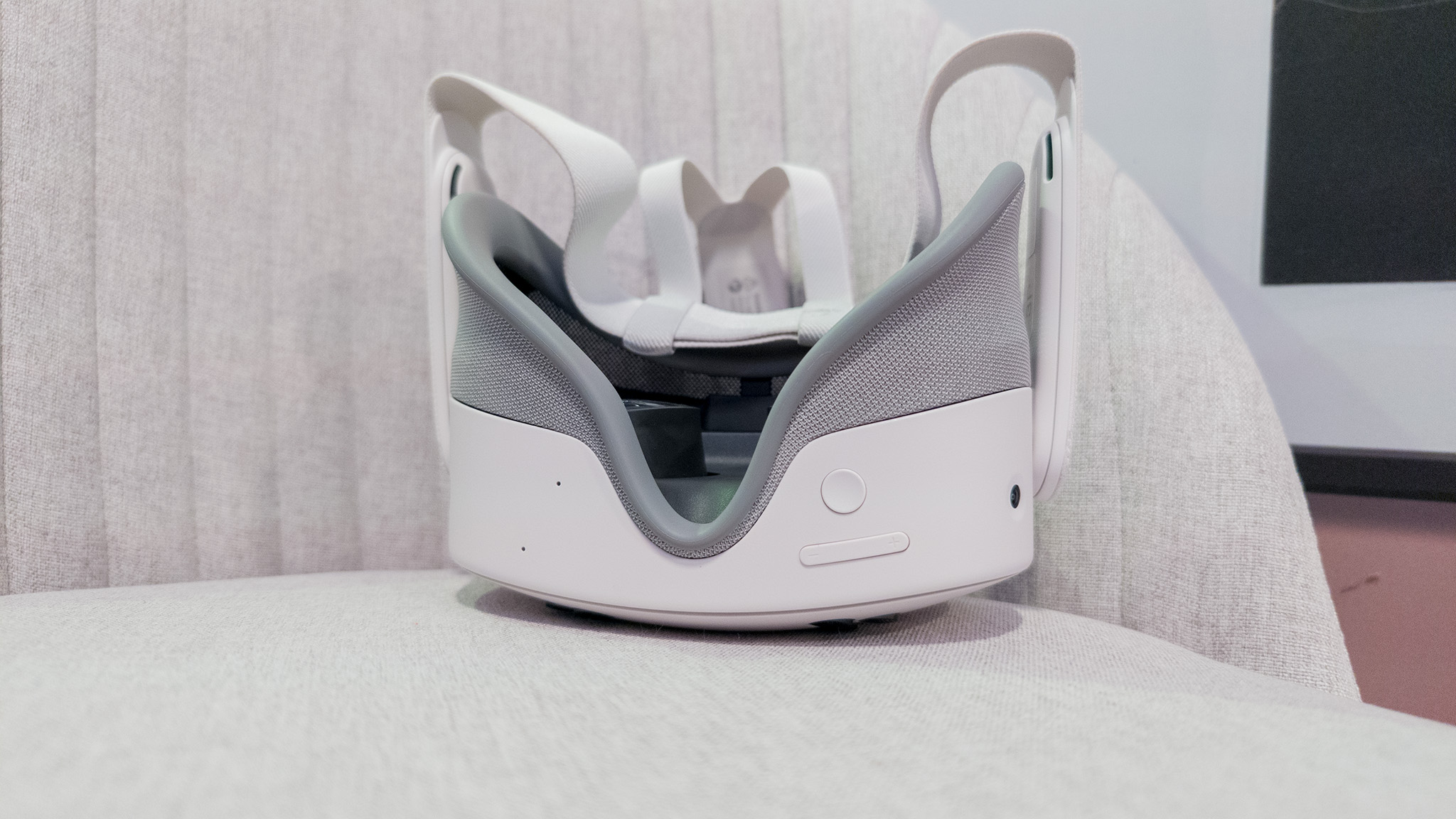
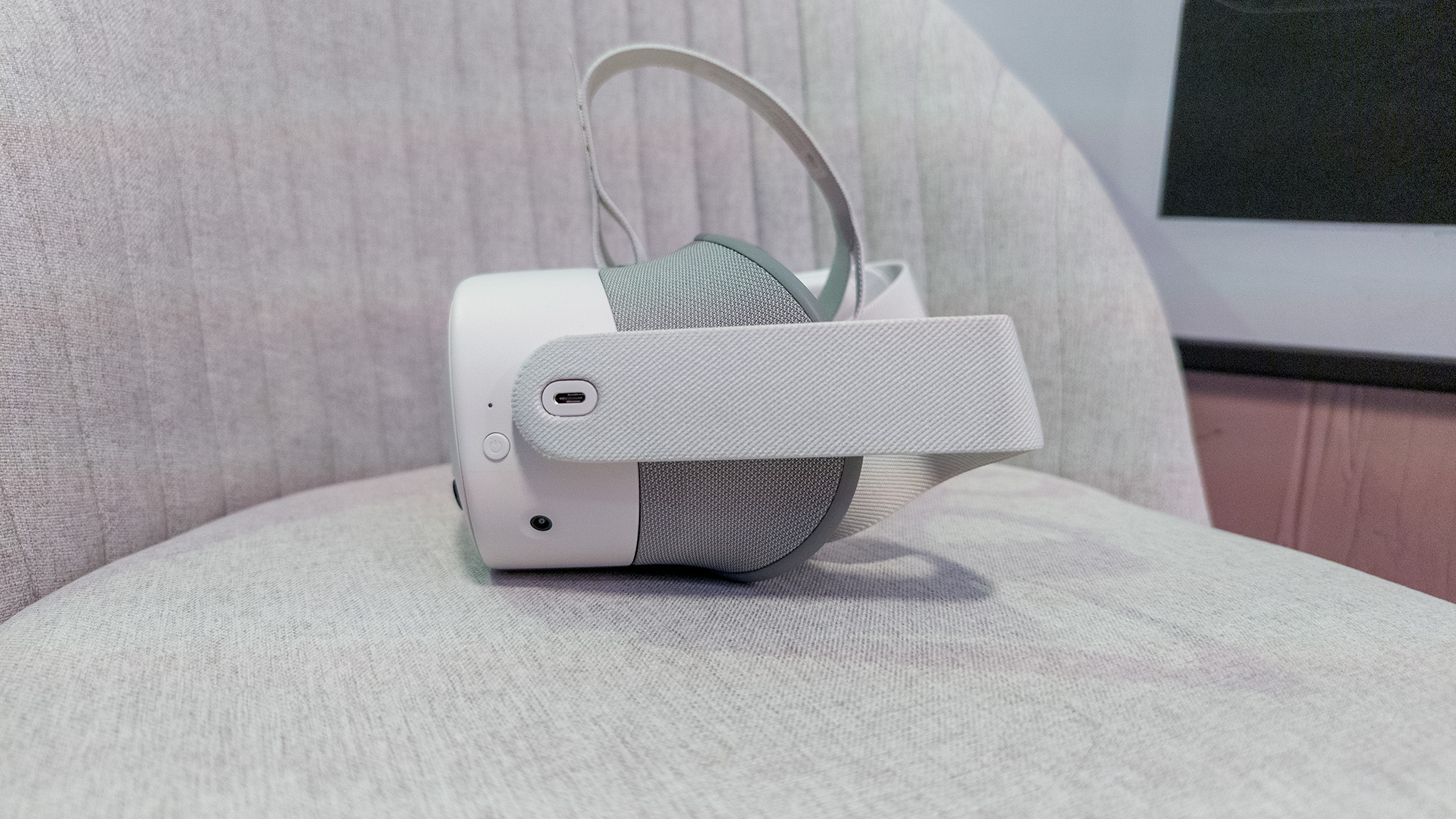
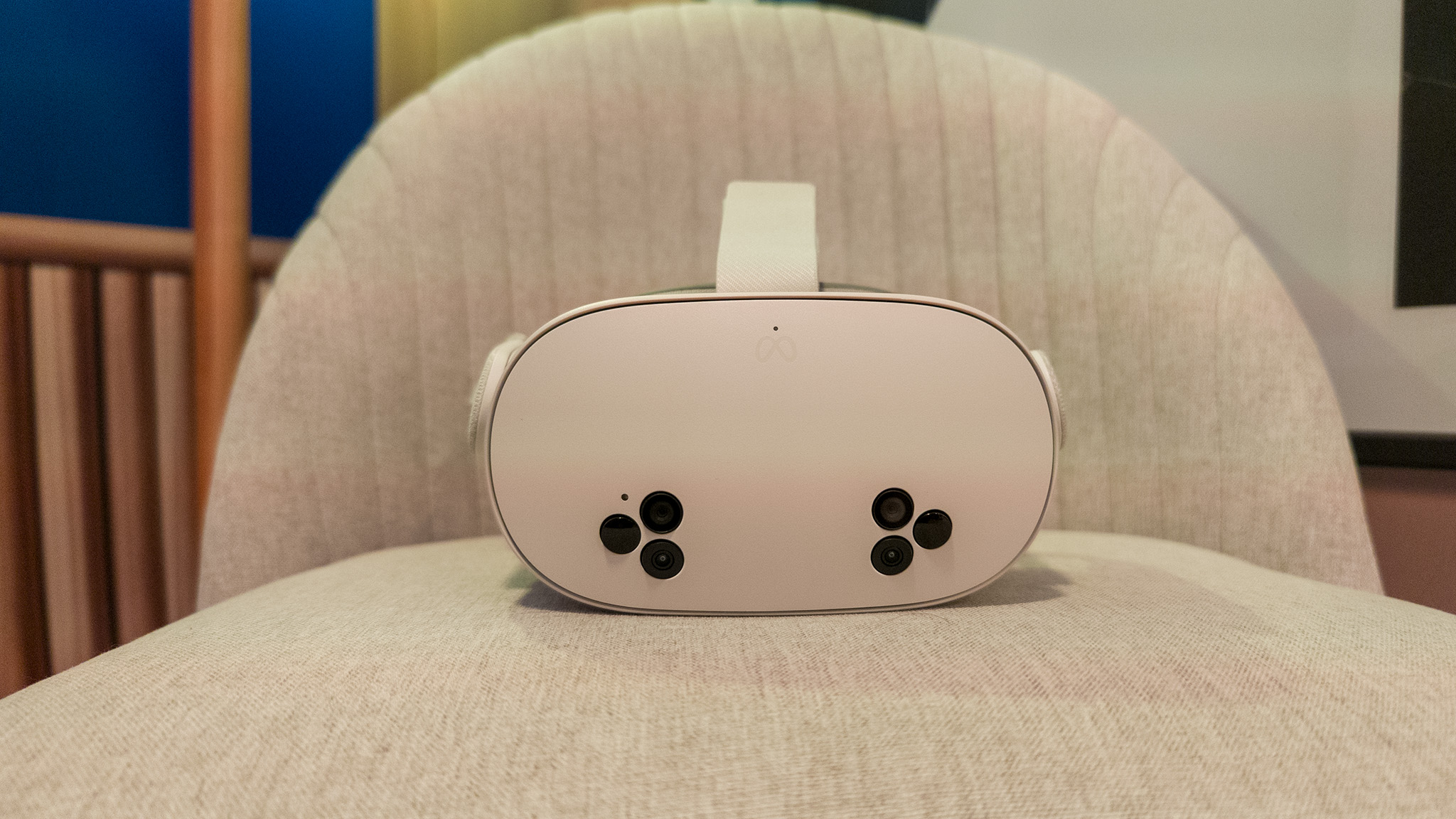
But while the headset looks different on the outside, wearing it felt identical to the Quest 2 from my recollection. The lenses and display are identical—including that annoyingly small "sweet spot" to get the clearest view—and adjusting lens spacing is done the same way by physically pushing them closer or further apart.
The lenses have three total preset distances you can switch between but, unlike the Quest 2, there's no physical numerical indicator on the headset to show which one is currently selected. Thankfully, the UI in the headset shows the number if you put it on fast enough. Since adjusting the IPD is the same as Quest 2, you can use the "halfway trick" I described in our Quest 2 IPD adjustment guide.
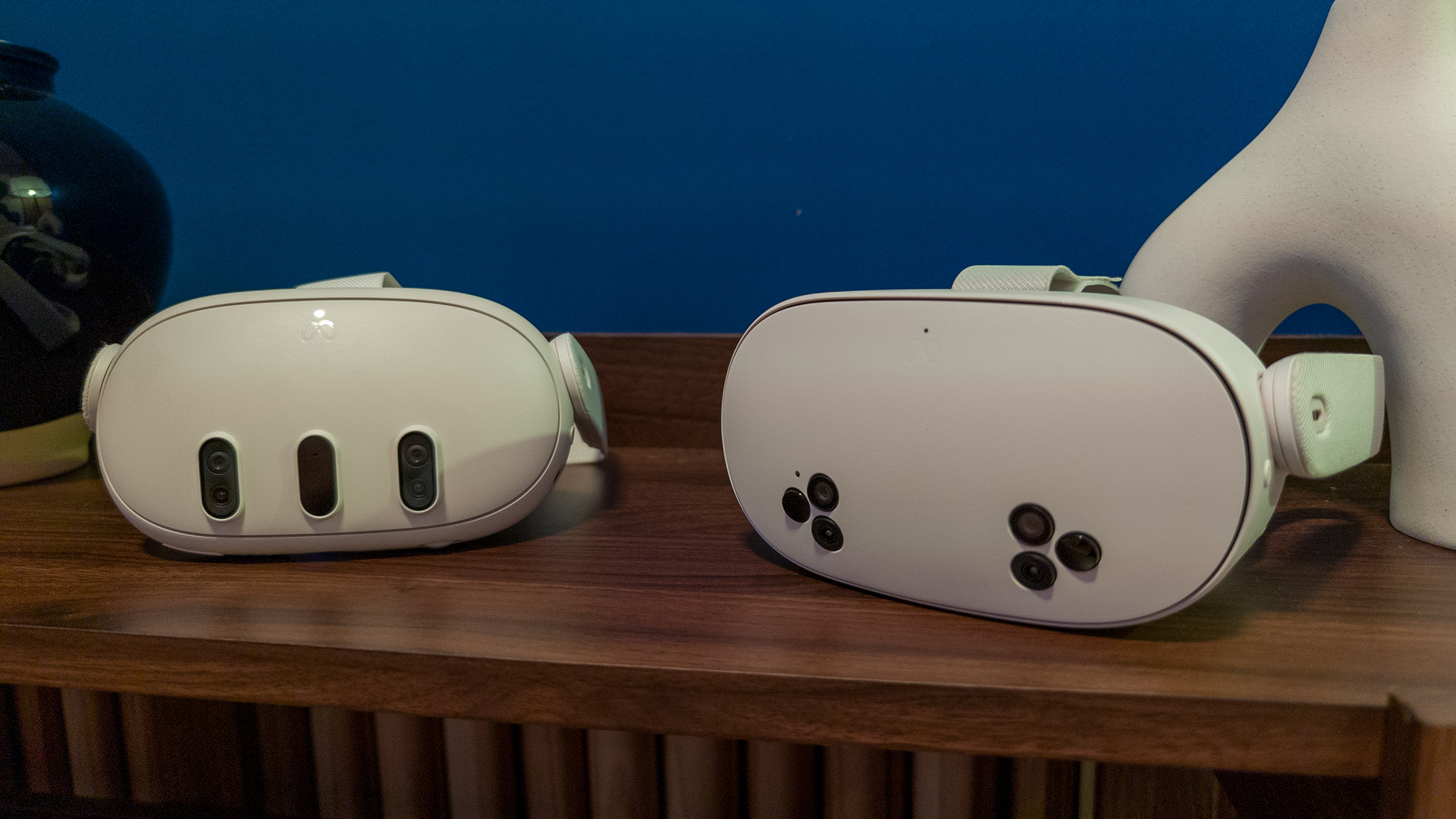
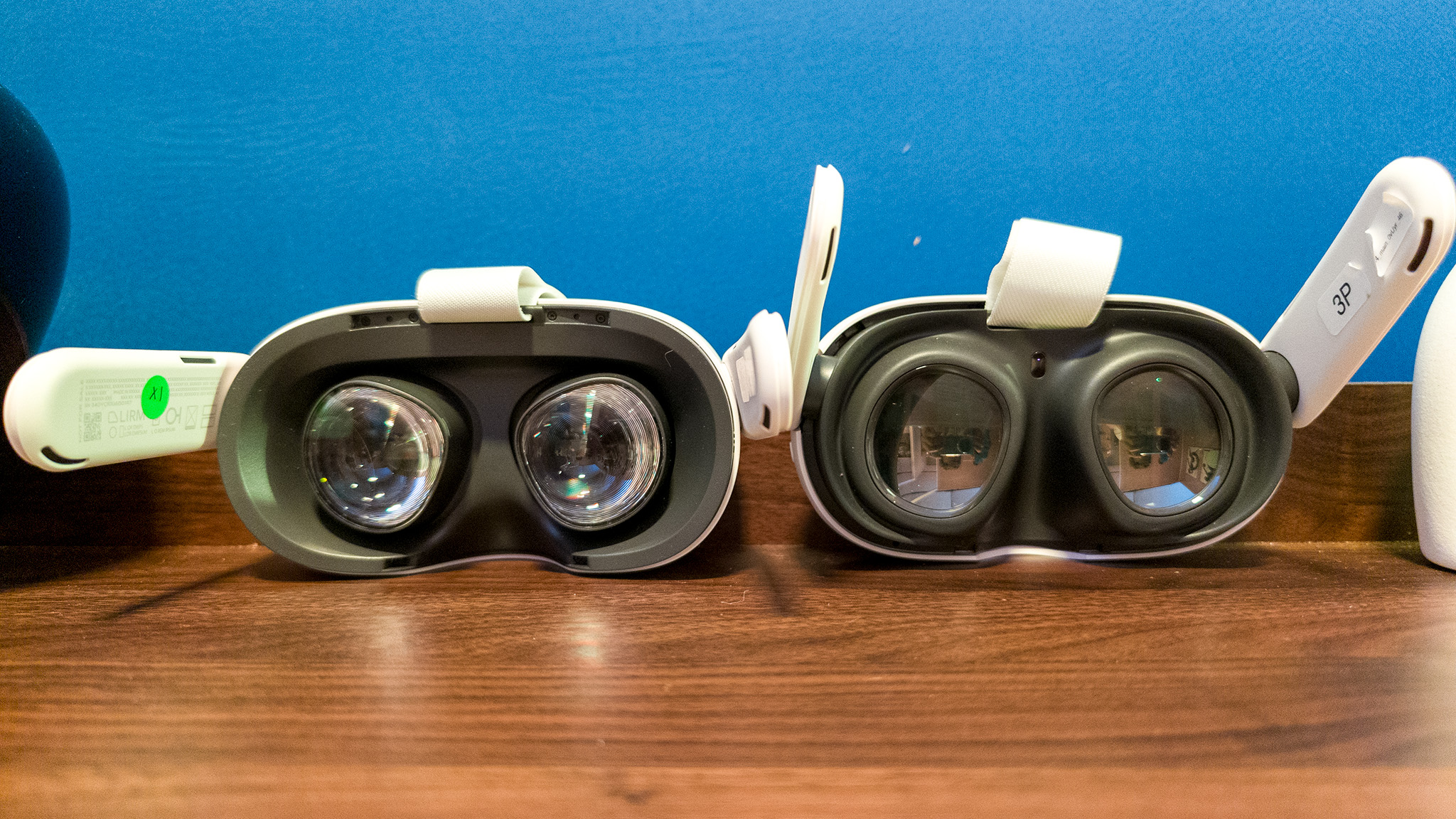
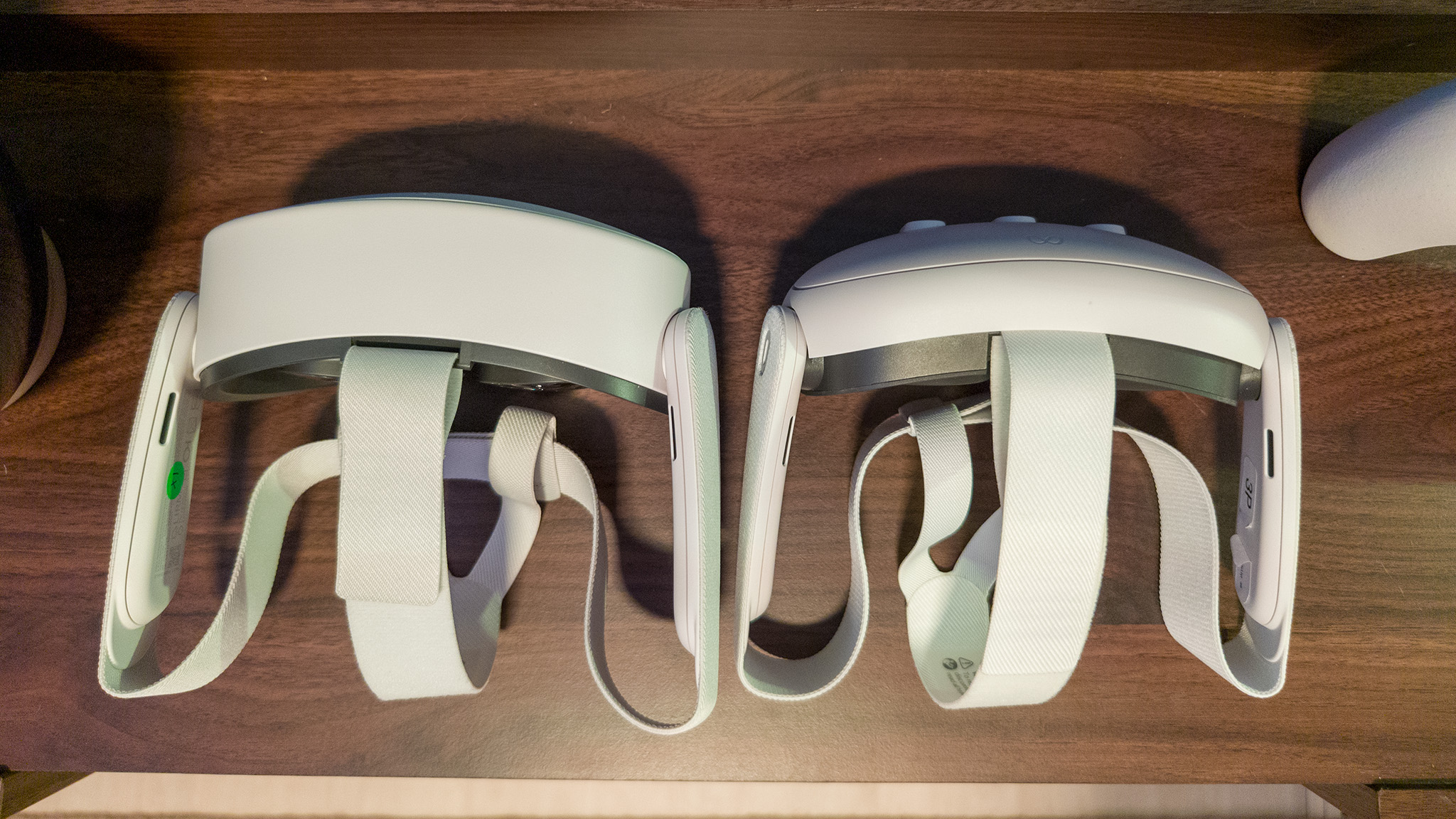
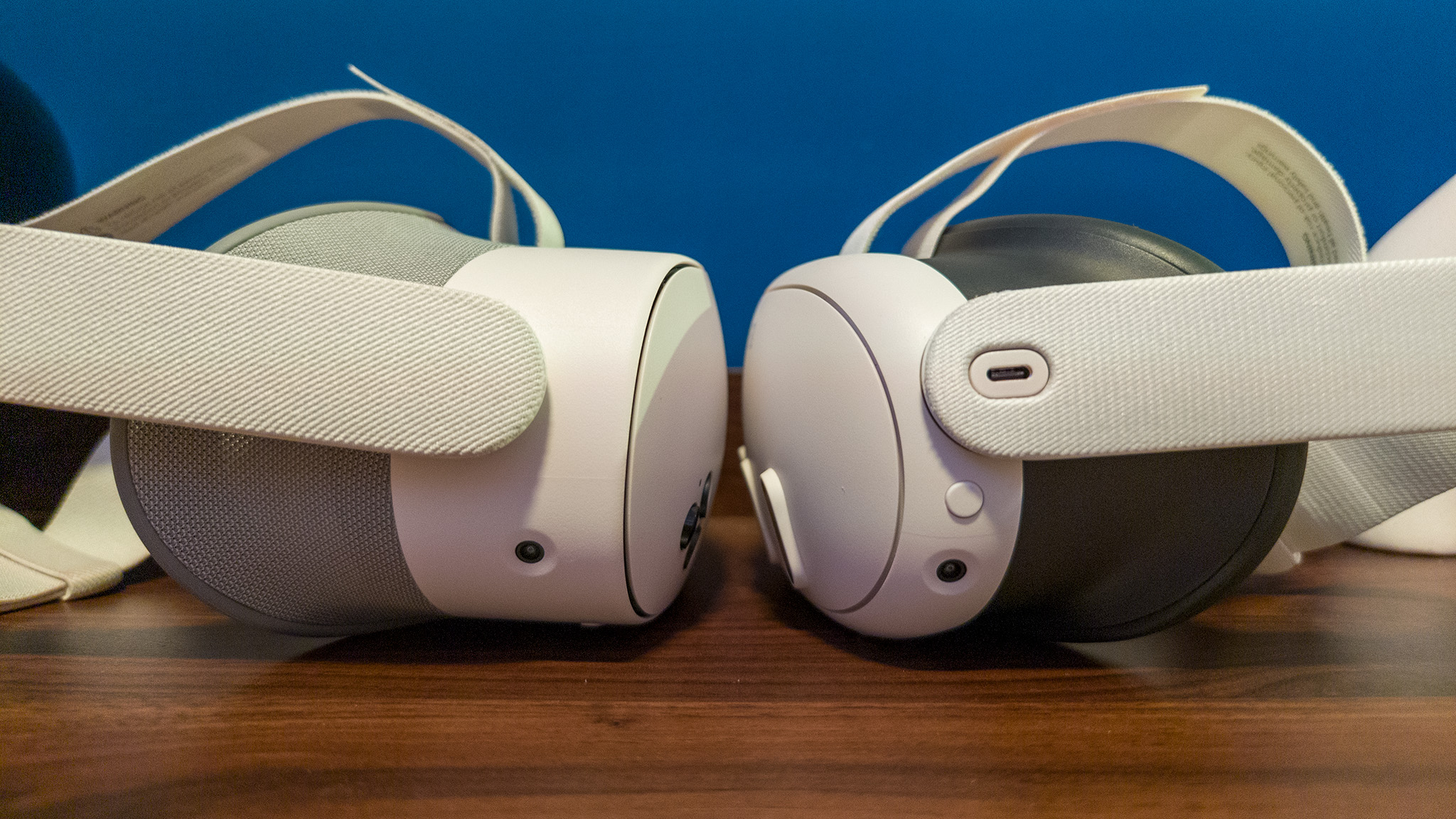
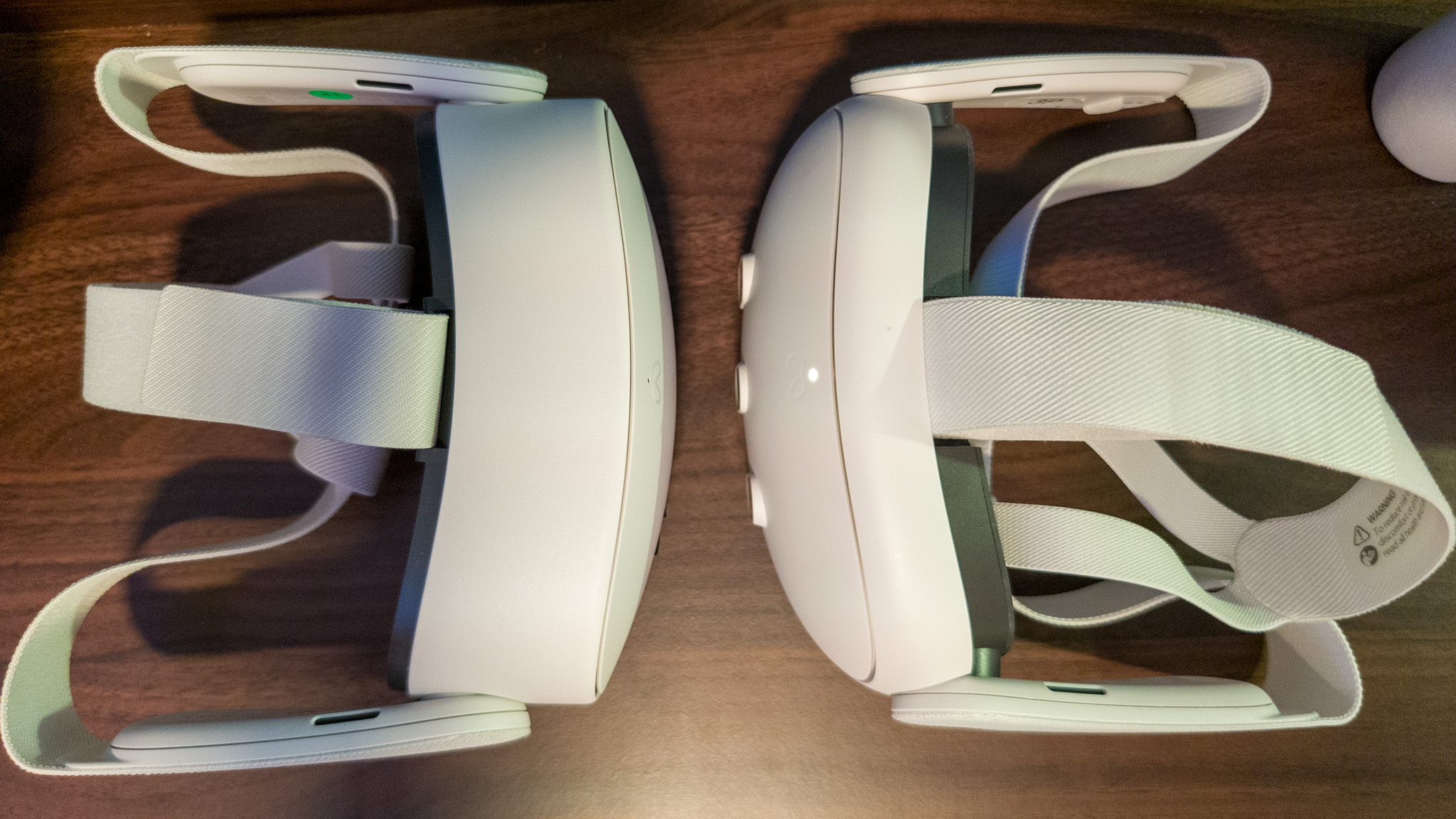
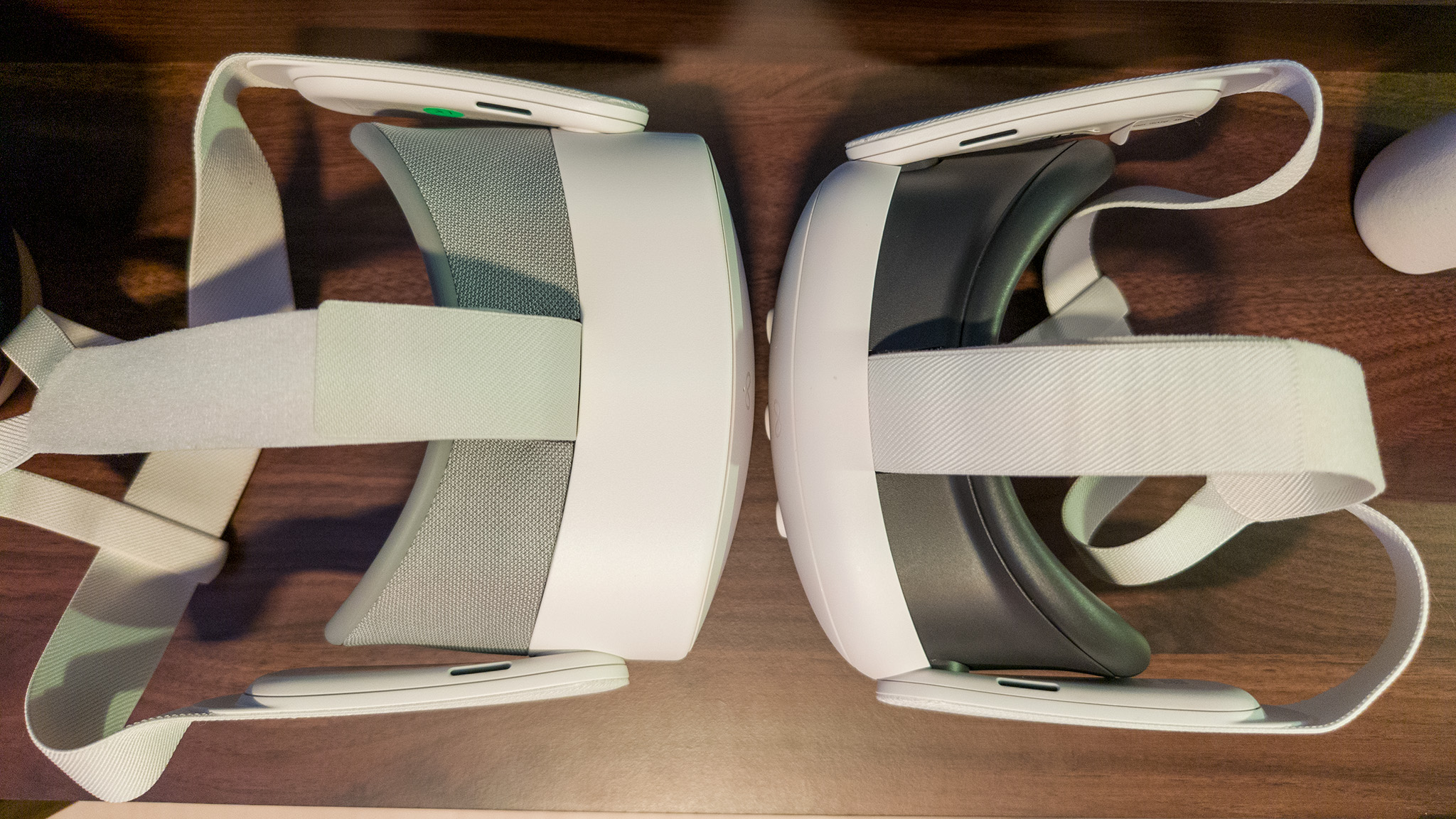
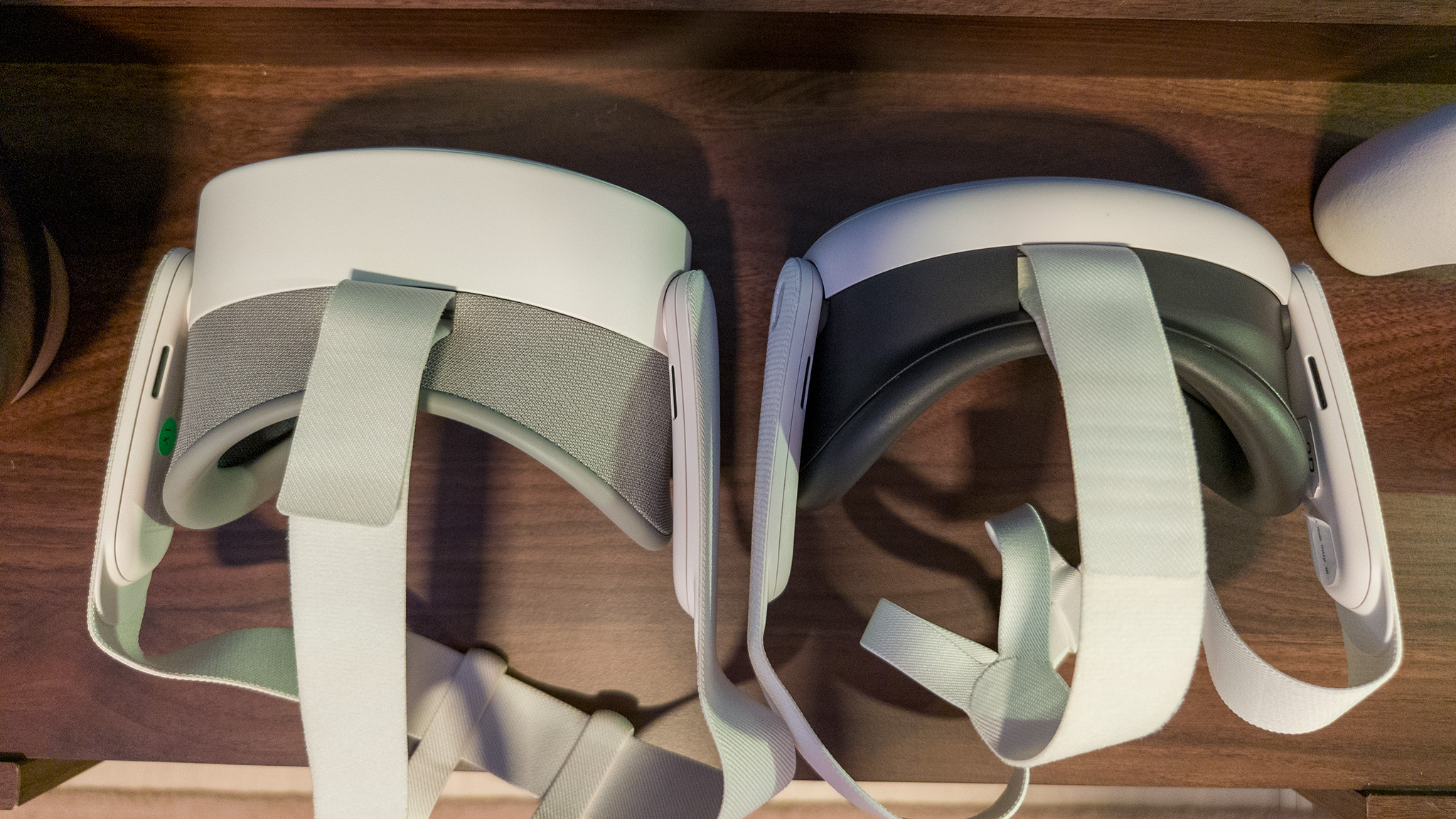
The six cameras on the front include two RGB cameras for stereoscopic color passthrough, two 4MP VGA sensors for space tracking and hand tracking—an identical resolution to Quest 3's cameras—and two flood LEDs to help with improved hand tracking and better tracking in dark environments. Two additional VGA sensors for spatial tracking are included on the left and right sides of the headset.
The Quest 3s still ships with a cloth headstrap, something that's become common on Quest headsets since the Quest 2. I still prefer the original Oculus Quest's firmer headstrap as the default option but at least headstraps are easily hot-swappable with great alternatives. Thankfully, the best Quest 3 accessories should mostly all work with the Quest 3S. That includes headstraps, but facial interfaces are different from Quest 2 and Quest 3. We'll put it through further tests once we have a final unit.
At 514g, it's 1g lighter than Quest 3 and 11g heavier than Quest 2. Most of the weight difference comes from the battery, as Quest 3S has a 20% larger battery than the Quest 2 and Meta states this helps it last up to an hour longer on a single charge than Quest 2.
To me, the fit felt identical to Quest 2, although I haven't used that headset with a cloth strap in years. I've always got a Quest 2 headstrap alternative on my unit at home.
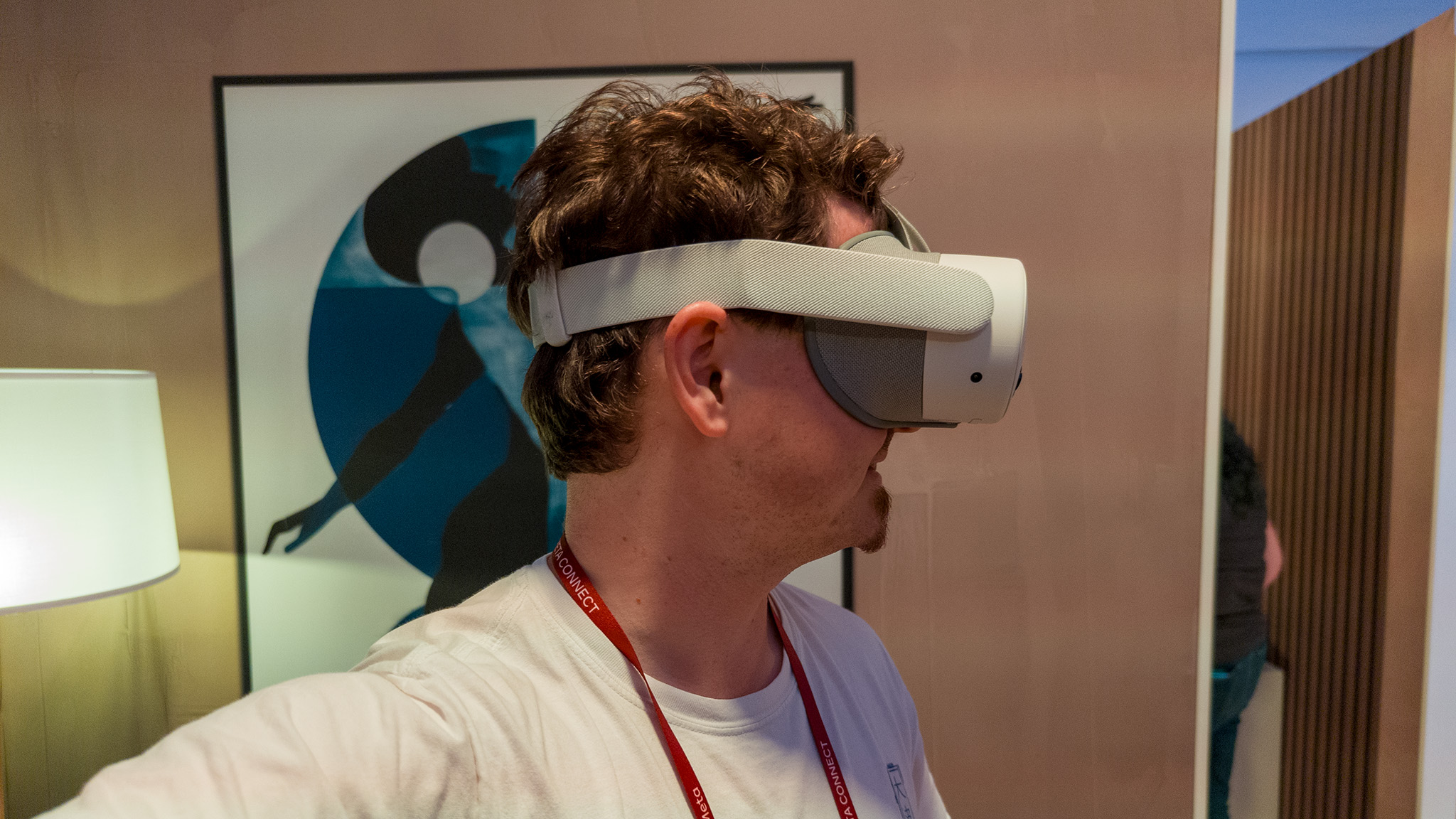
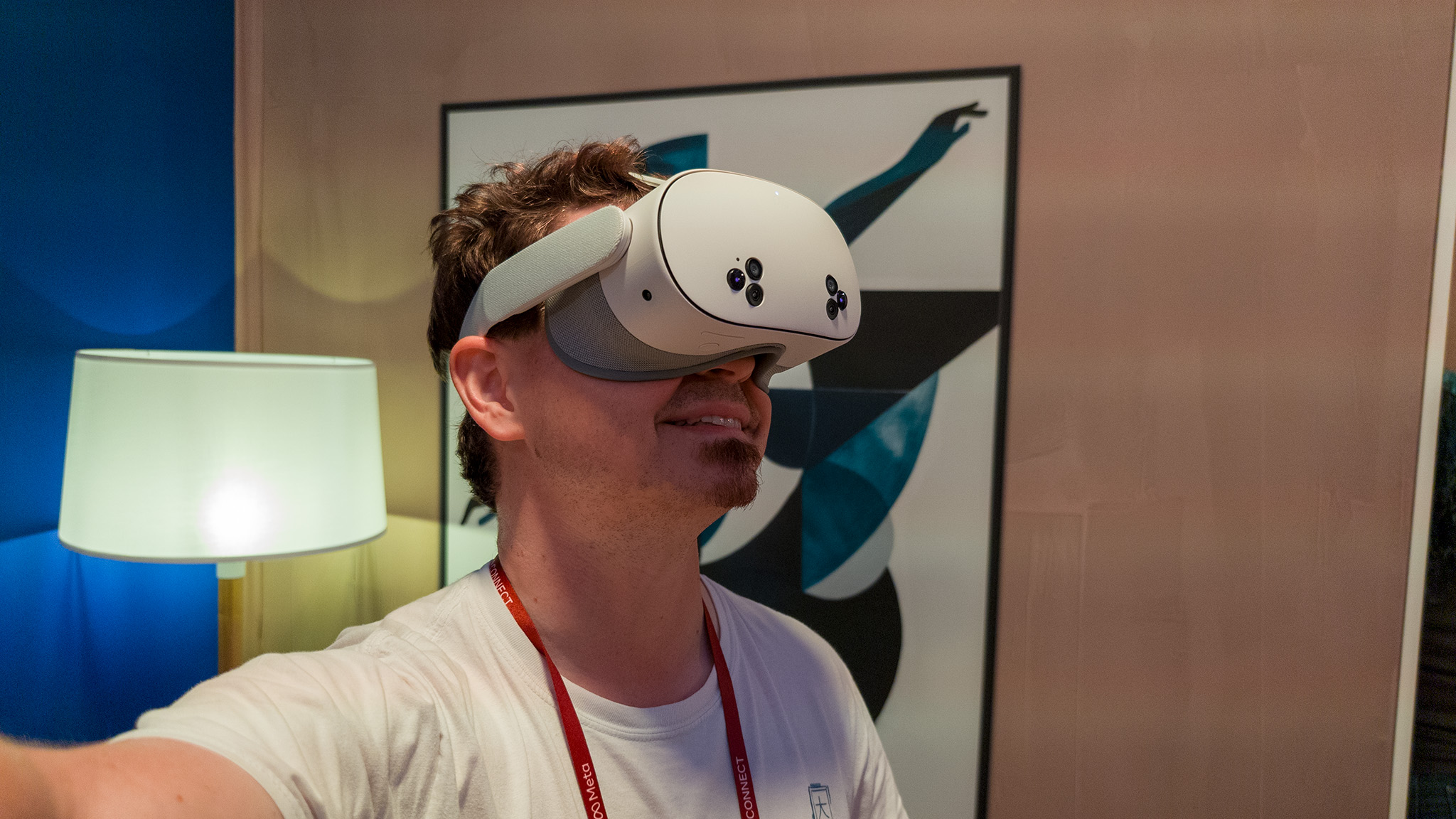
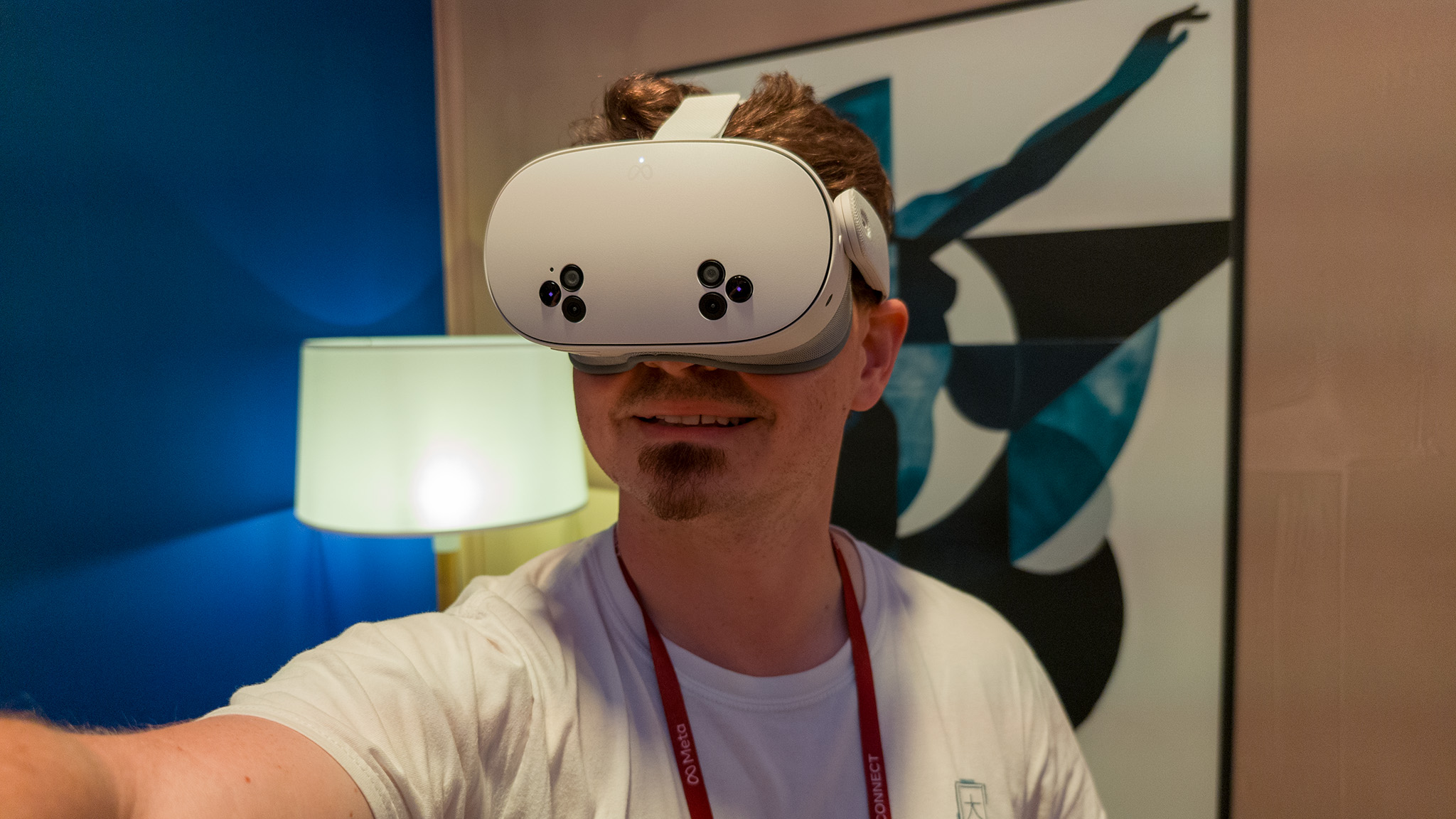
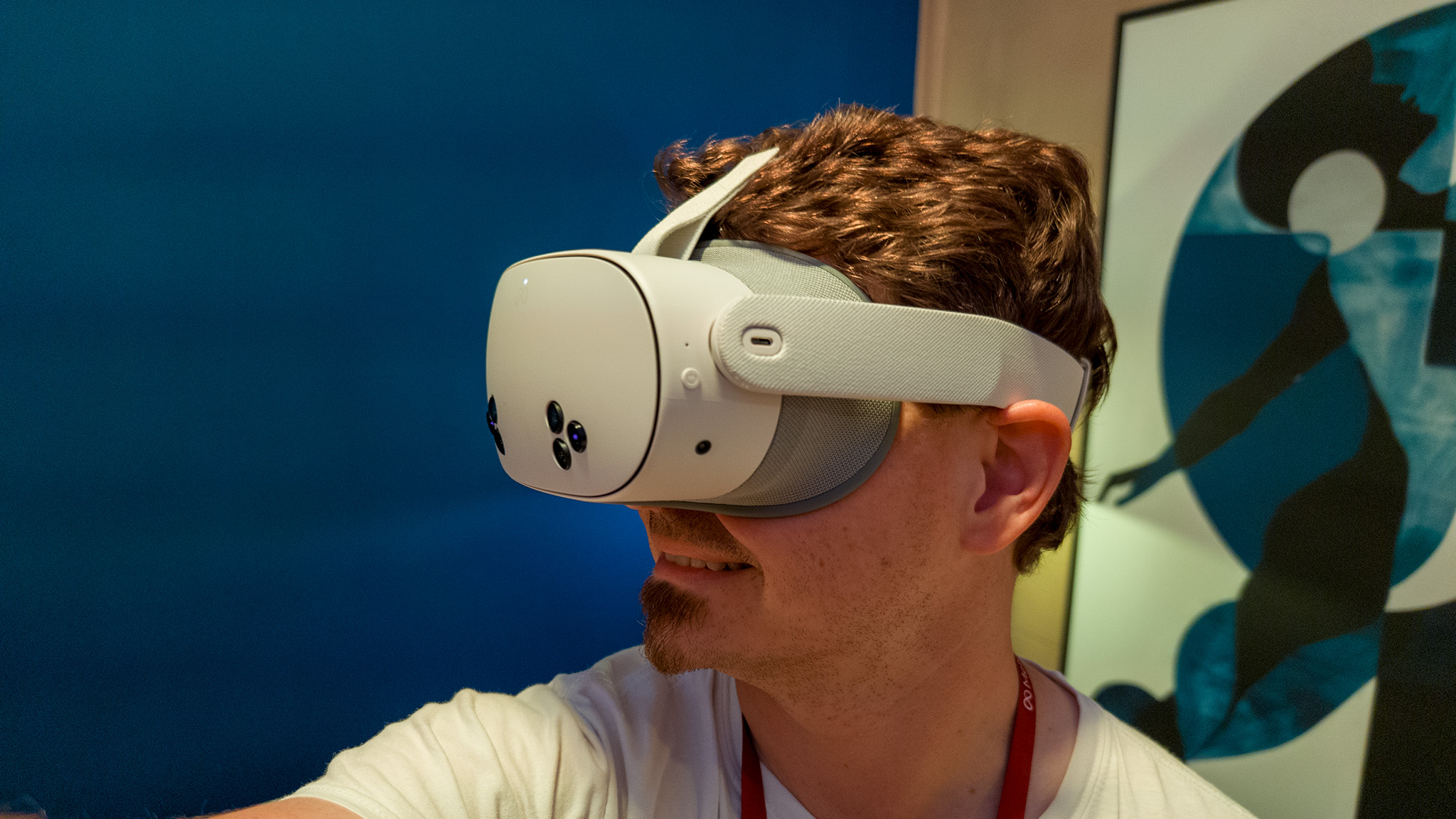
Something to note is that Meta removed the 3.5mm headphone jack on the Quest 3s, meaning you'll need to pick up a pair of Vega T1 earbuds if you want to enjoy more private audio. Of course, the speakers built in to the headstrap arms still deliver great audio quality with plenty of volume, so there's no need to pick up a pair right away if you want to save money.
Most of the time I don't even bother with headphones or earbuds on my Quest 3 and I can't see that changing here. If you do want to change the volume, it's done with the volume rocker buttons on the underside of the headset which are located in front of a new action button.
This round action button acts as an easy way to quickly switch between immersive and mixed reality modes, replacing the haphazard double-tap gesture on previous Meta Quest headsets. This is an immensely better design than that old gesture as it works every time you press it, unlike the unreliable gesture of old.
Meta Quest 3S: Mixed reality clarity
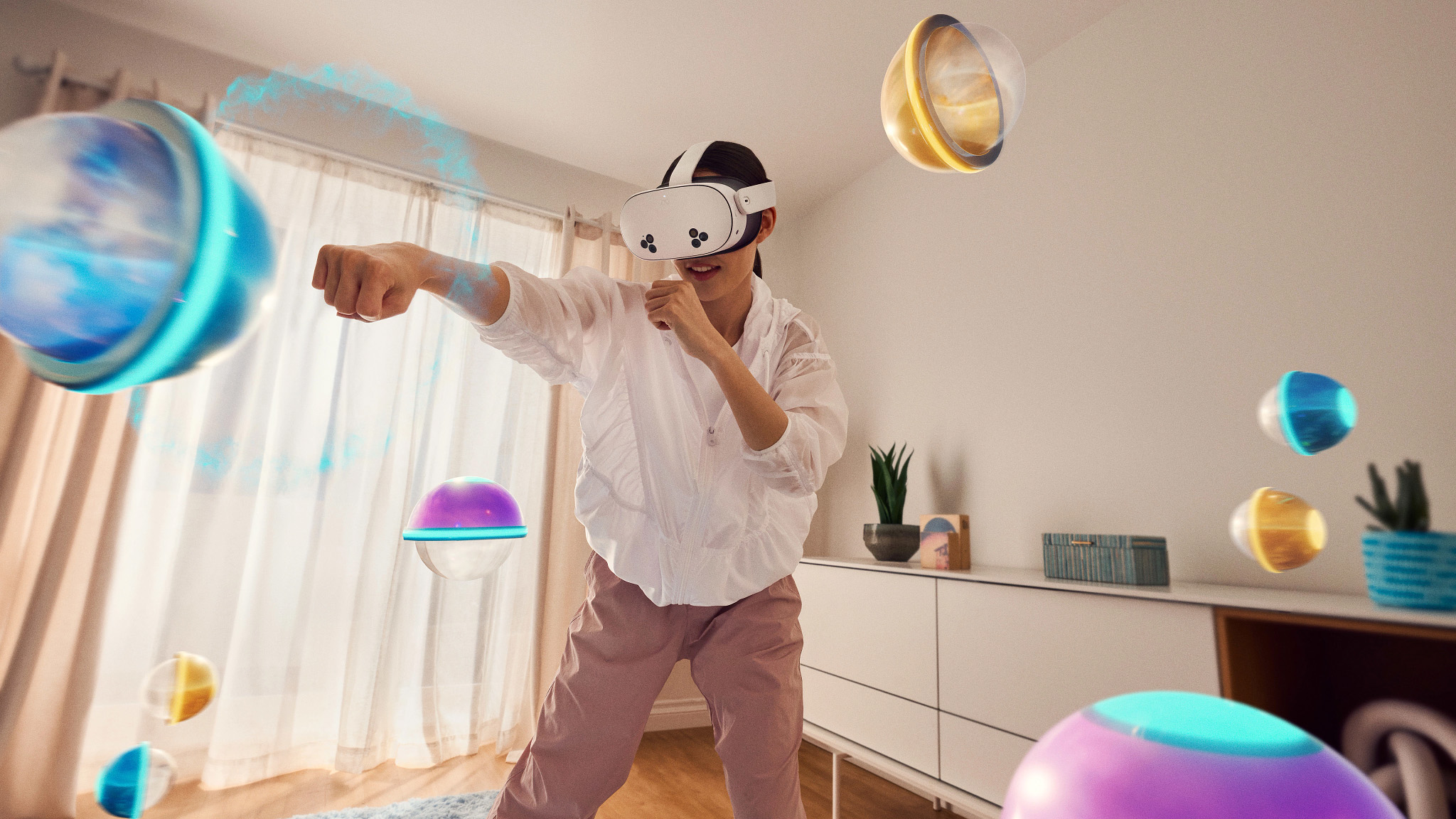
One of the best upgrades when moving from Quest 2 to Quest 3 was the color passthrough vision. Thankfully, the Meta Quest 3s also features color passthrough vision, meaning when you put your headset on, you see the room around you in full color just as your eyes do.
This makes it easy to put the headset on and walk around your house, take a drink, or even talk to someone without having to remove it. In general, it reduces friction and makes it feel less like you're wearing a headset and more like you just stepped into a virtual world.
Visual quality of the mixed reality looked identical to a Quest 3 I had side-by-side at the event. The room was in color, resolution was high enough so that I had no problem seeing what I was doing or talking to the people in the room while wearing the headset.
The biggest difference is the lenses, which aren't as clear as the Quest 3's pancake lenses and have a very small sweet spot. If you've used a Quest 2, you'll be familiar with this.

Quest 3s supports all mixed reality games from the Quest 3, so excellent titles like Starship Home — which turns your room into a spaceship in a 5-6 hour long intergalactic adventure — are fully playable here. That also means existing games that make use of mixed reality to enhance safety and immersion can be fully enjoyed on Quest 3s as they can on Quest 3.
Booting up Racket Club will let you place the court right in your room, making you feel good about giving it your all when you swing without worrying about hitting something since you can still *see* the room around you. Other games like Smash Drums take advantage of the same concept, putting the drum set in your room and letting you go ham while playing popular songs — again, all without having to worry about smacking the dog or your kid with a controller when you're in the middle of a jam session.
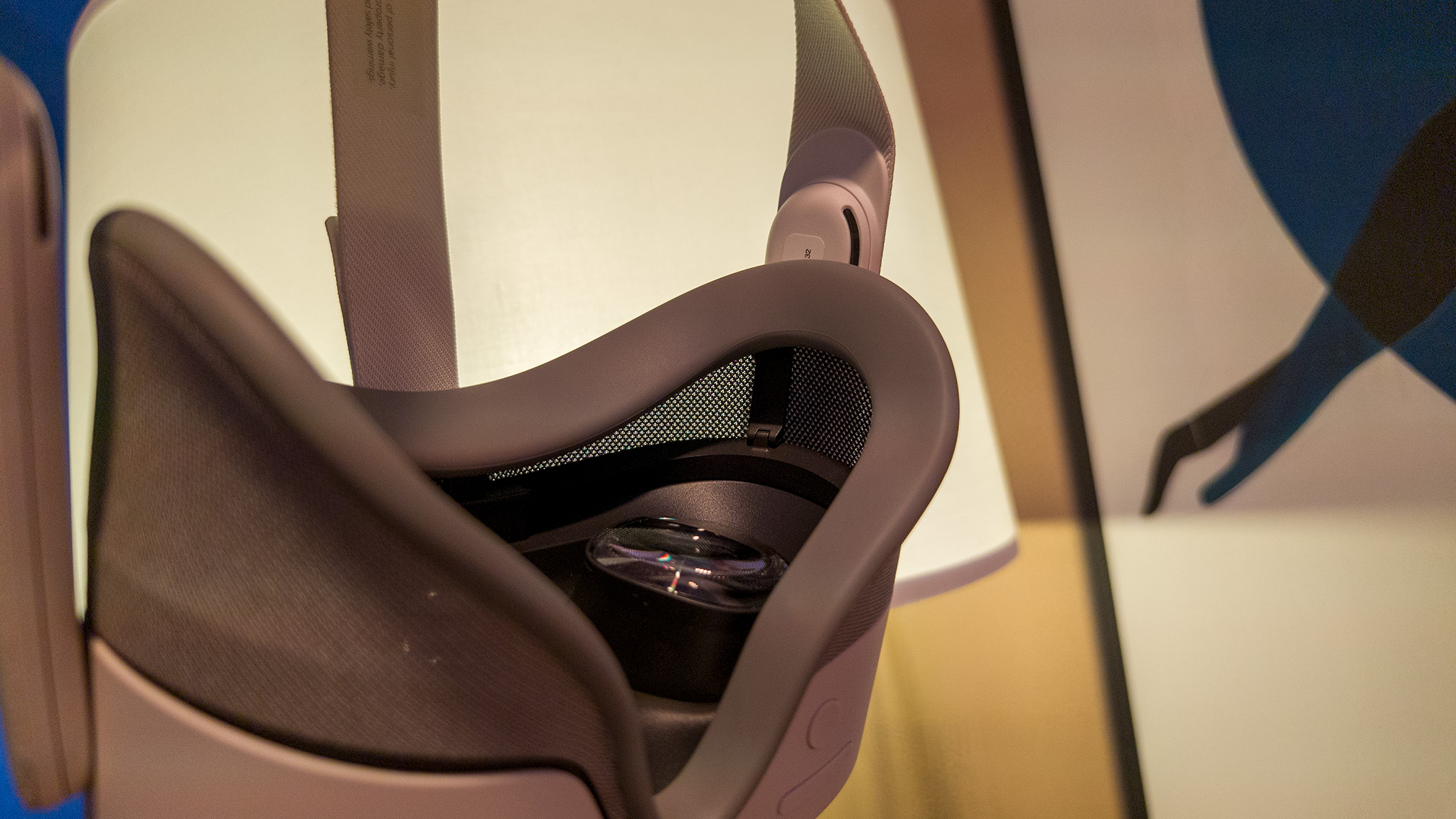
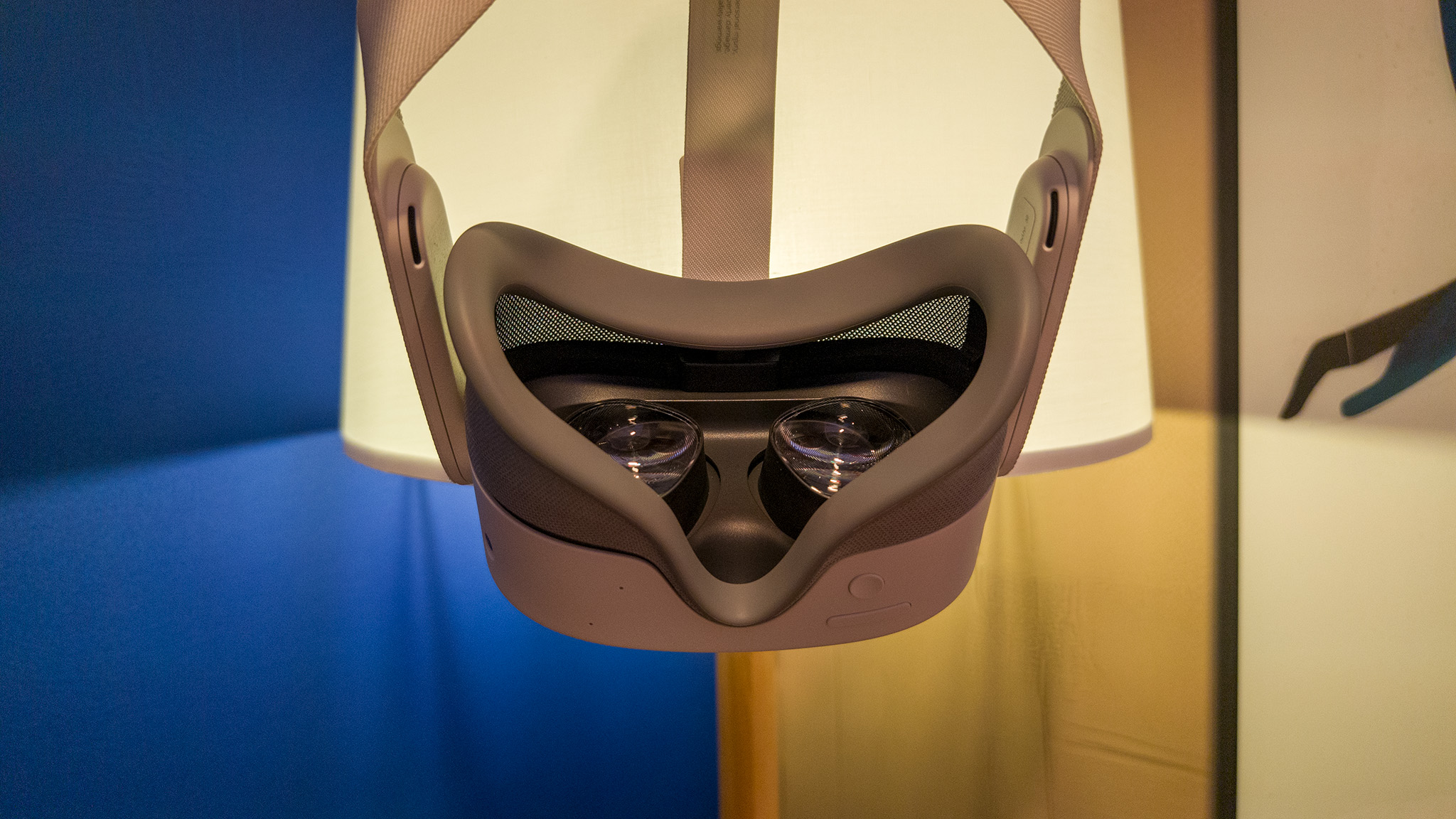
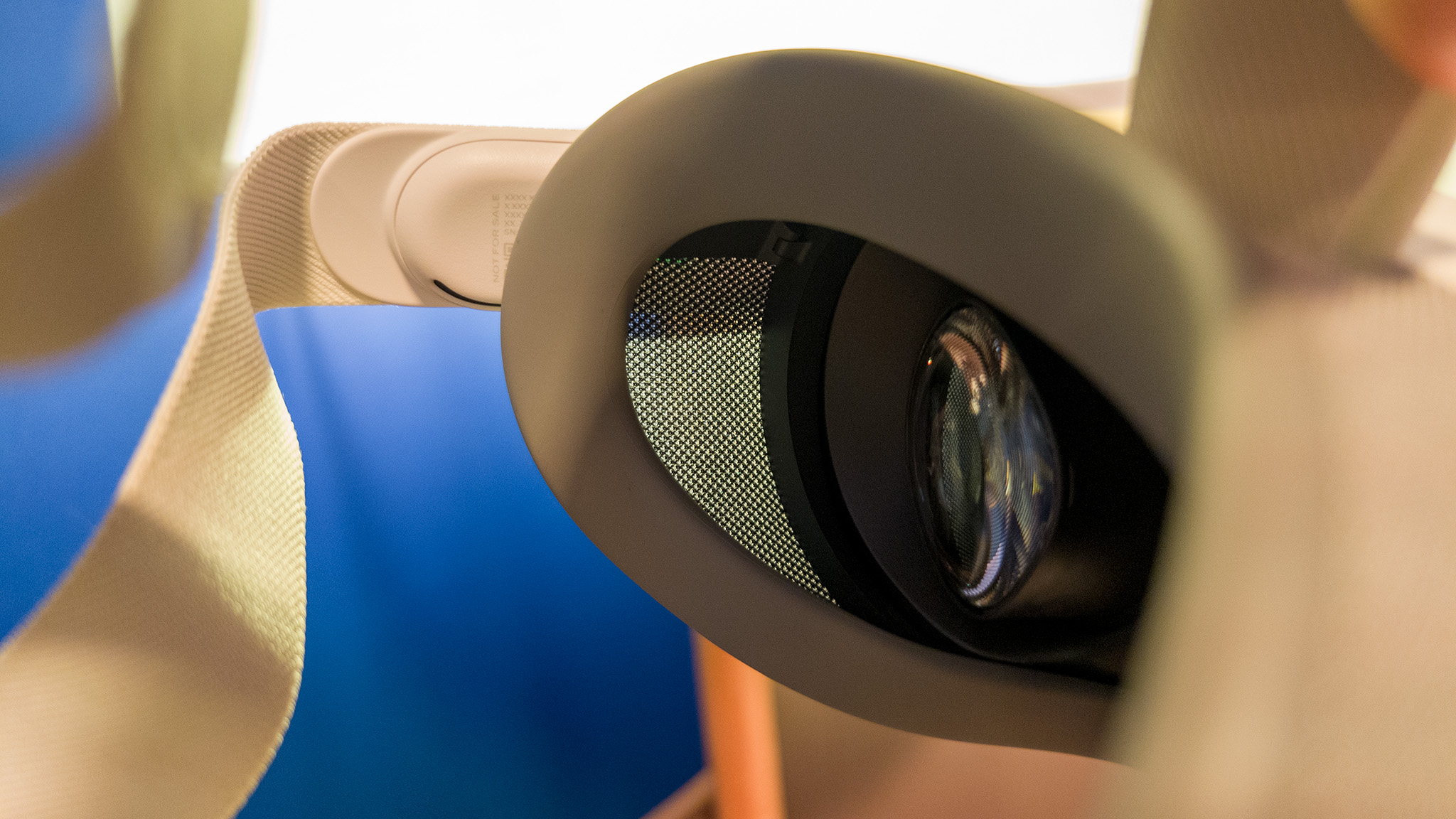
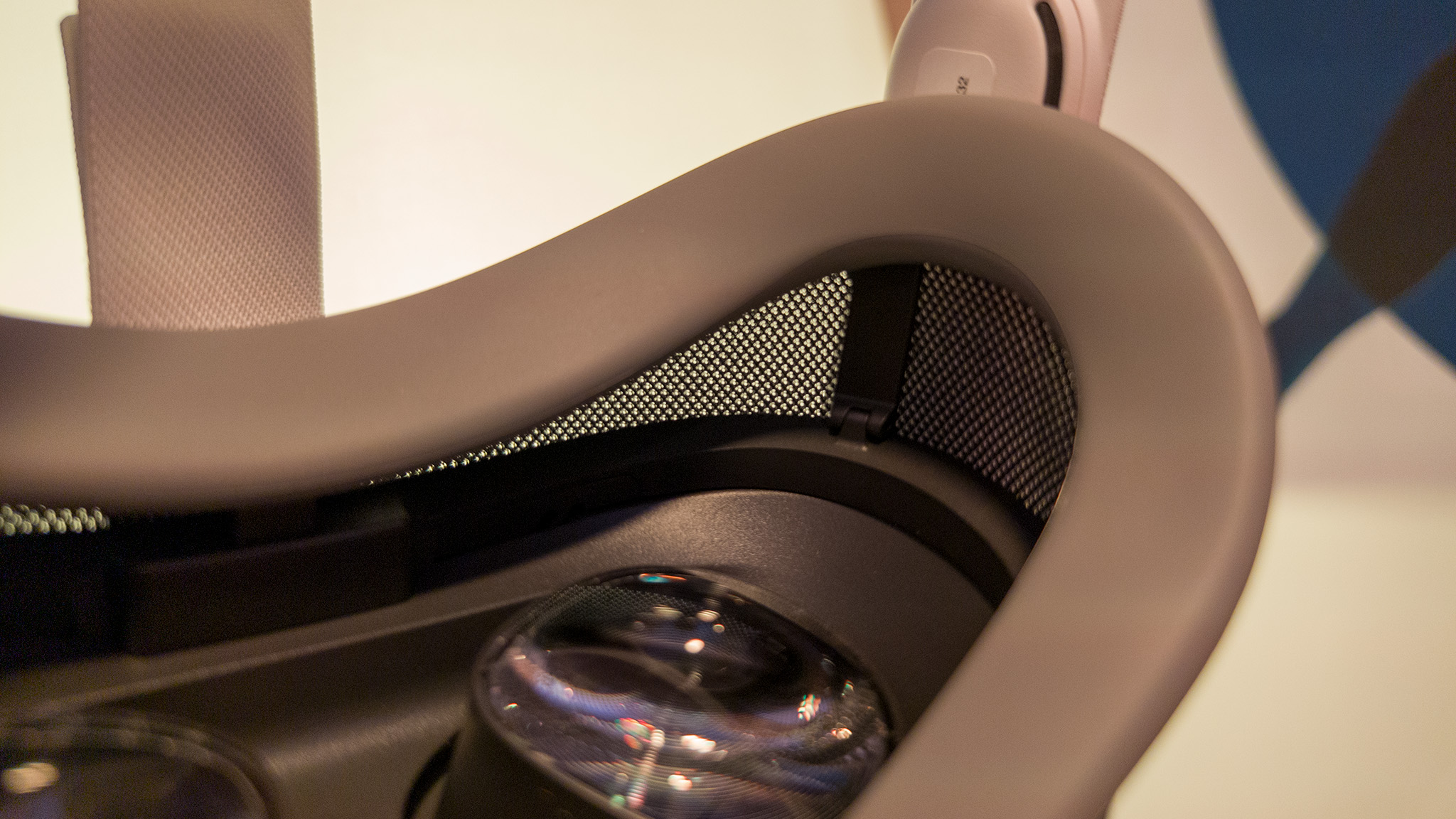
Meta representatives also showed me a new Breathable Facial Interface that helps enhance mixed reality content by helping you see the room around you in your peripheral vision. A breathable mesh is sandwiched between the padded silicone face pad and the headset connection points, which both enhance ventilation and let you see the room around you in a subtle way.
It's an interesting alternative to the open periphery Quest 3 facial interface I also got to see at Meta Connect 2024 as it solves problems without being as jarring as a fully open periphery may be for some folks.
Meta Quest 3S: Controllers
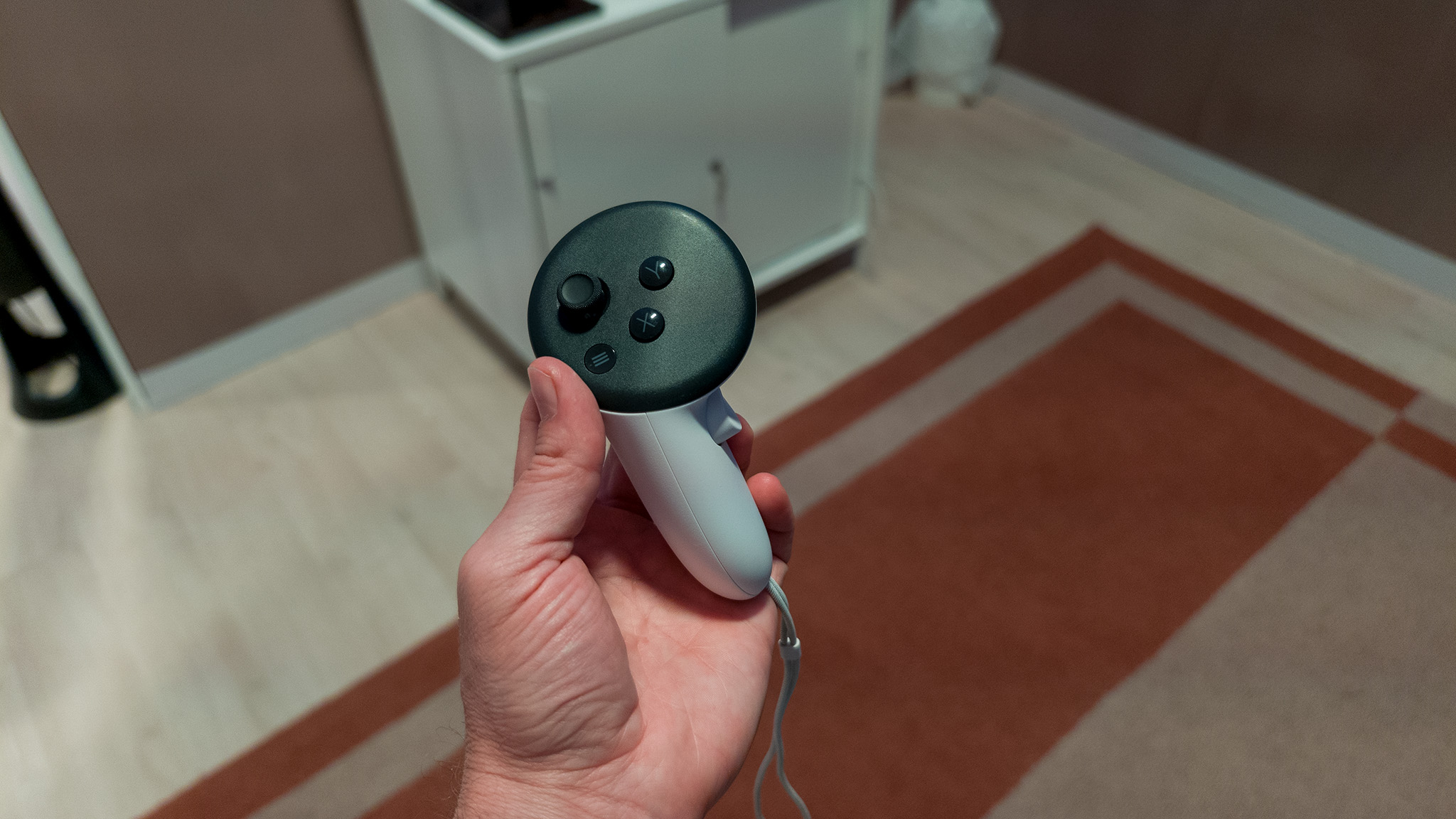
The Meta Quest 3S ships with the same excellent Meta Touch controllers that debuted with the Meta Quest 3. This means you not only get the same great ergonomic improvements over the Quest 2's controllers, but they also remove the annoying ring around the controller and include much better haptics.
Each controller is powered by a single AA battery. I personally use these cost-efficient rechargeable AA batteries from Amazon in my Quest controllers and have been happy with their multi-week battery life.
The battery door on each controller connects via an ingenious little button that makes it easy to swap out for any number of controller accessories. These AMVR controller grips have long been my go-to controller accessory for everyday use.
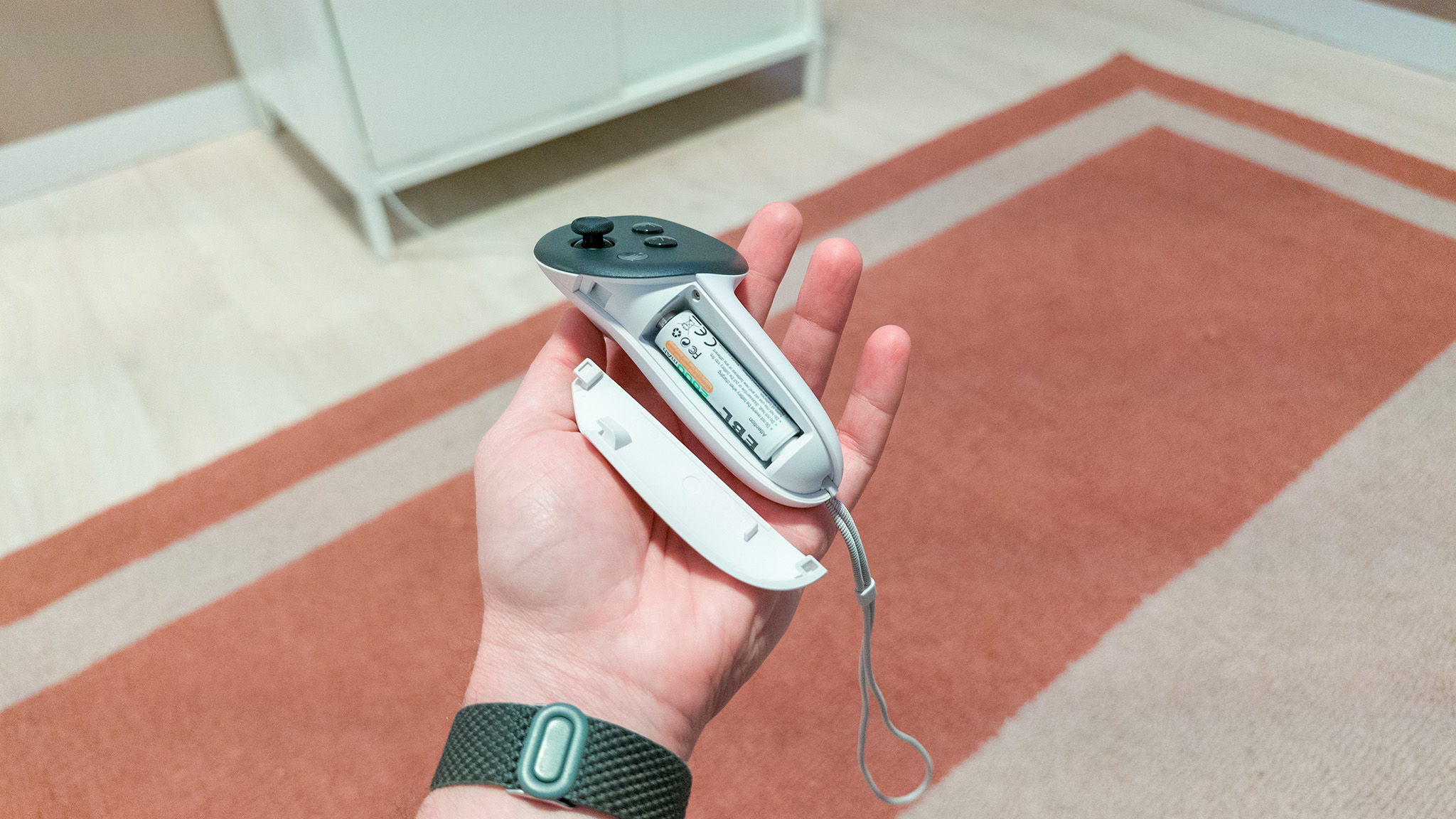
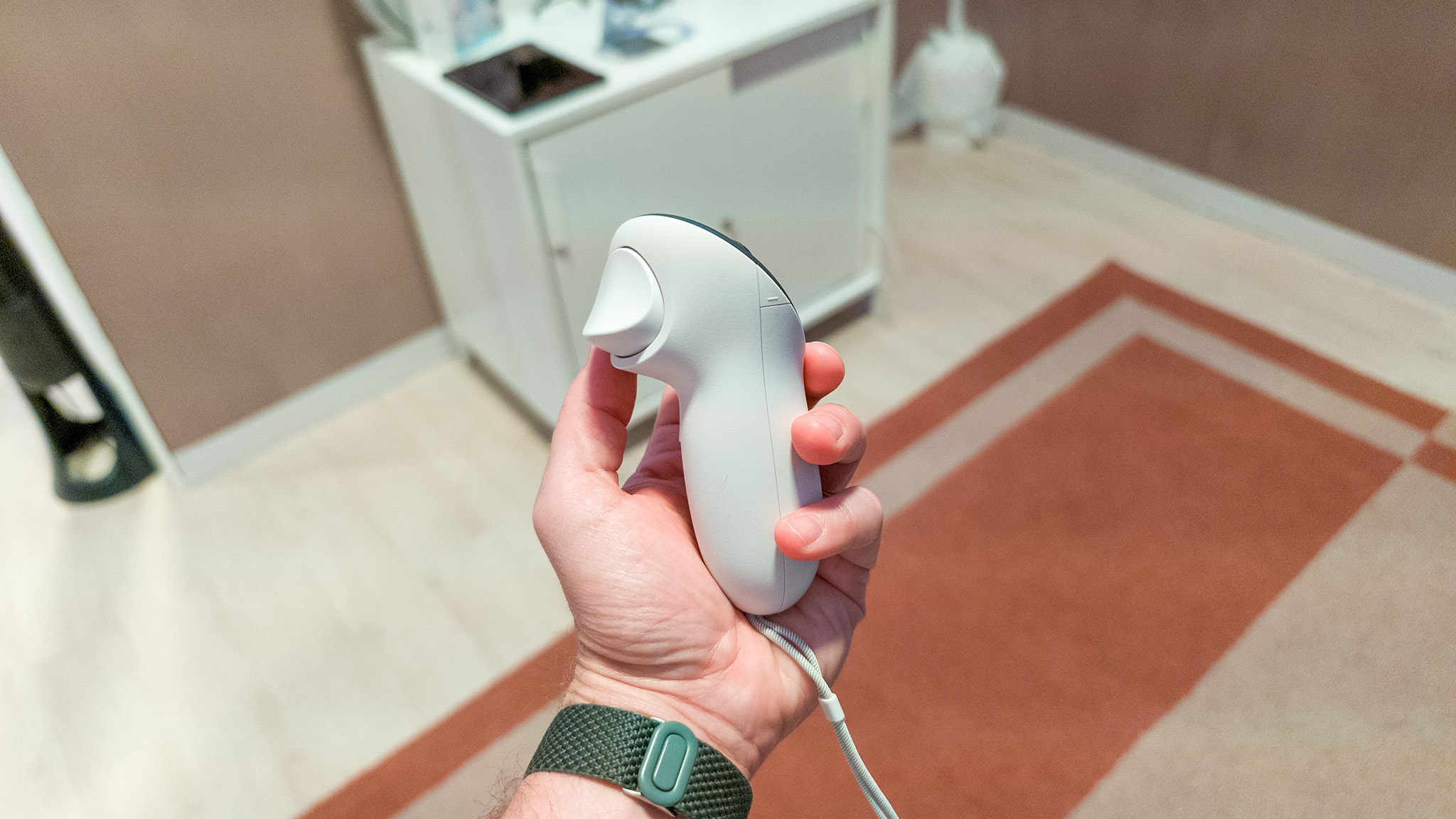
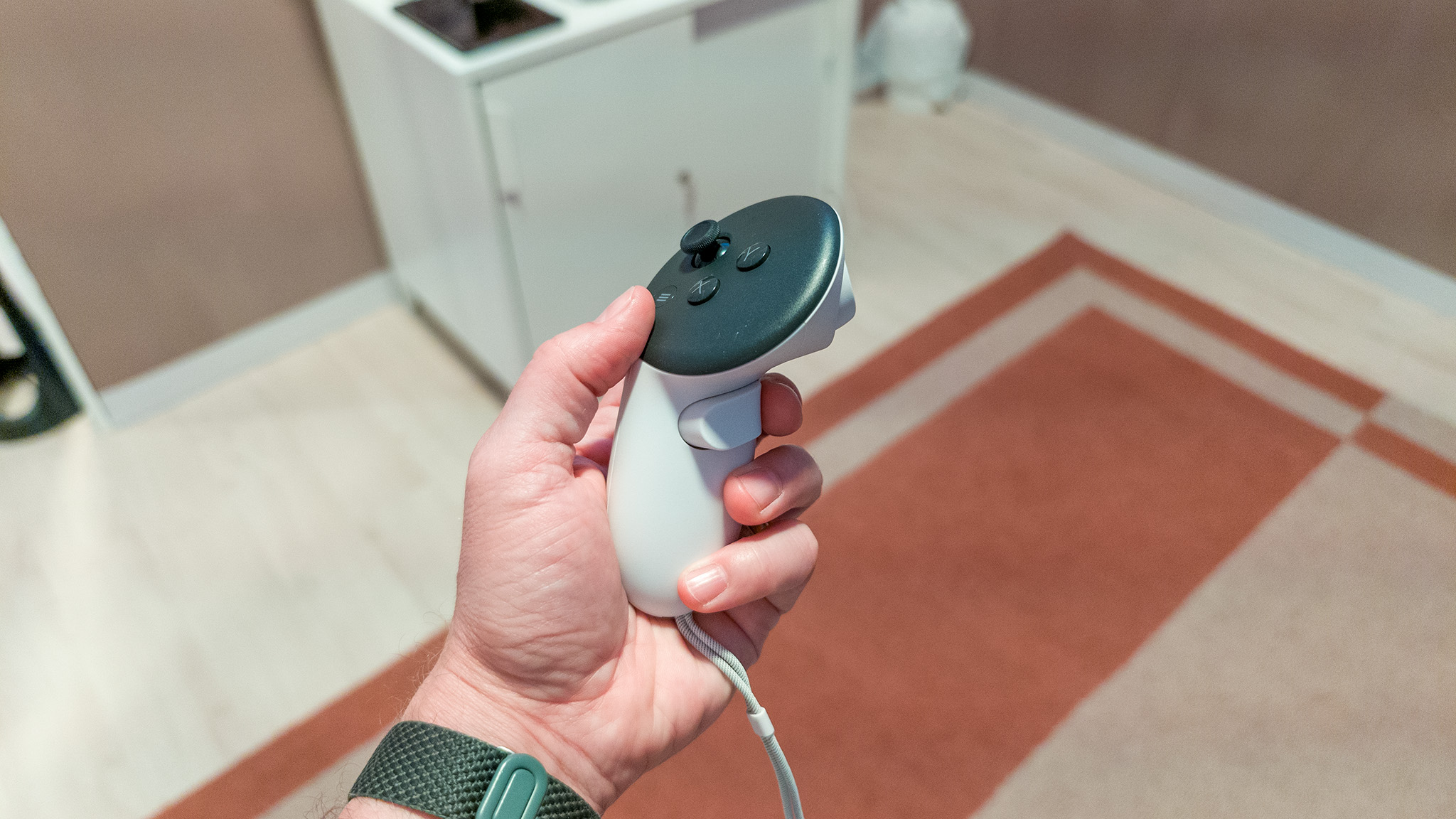
Meta Quest 3S: Software and games

Everything you can do on a Meta Quest 3 can be done on a Meta Quest 3S. No exceptions.
Like the rest of the Quest lineup, the Meta Quest 3S runs Meta's Horizon OS, an operating system built on Android without all the Google services and apps. Meta recently minted the new name back in April when it announced it would be offering the OS to other manufacturers to make their own VR headsets, including companies like Lenovo, ASUS ROG, and Microsoft Xbox.
Meta has updated its OS monthly since the first Oculus Quest debuted, adding new features and services with each release. Just last month, Meta finally pulled support for the aging Oculus Quest after over five years of updates. Meta will no longer be selling the Quest 2 at the end of this year but previously comitted to three additional years of updates before it pulls the plug on that headset.
That means you can likely expect the Quest 3S to be supported with updates until 2030 or so if things stay the same.
Meta Quest 3S: Specs
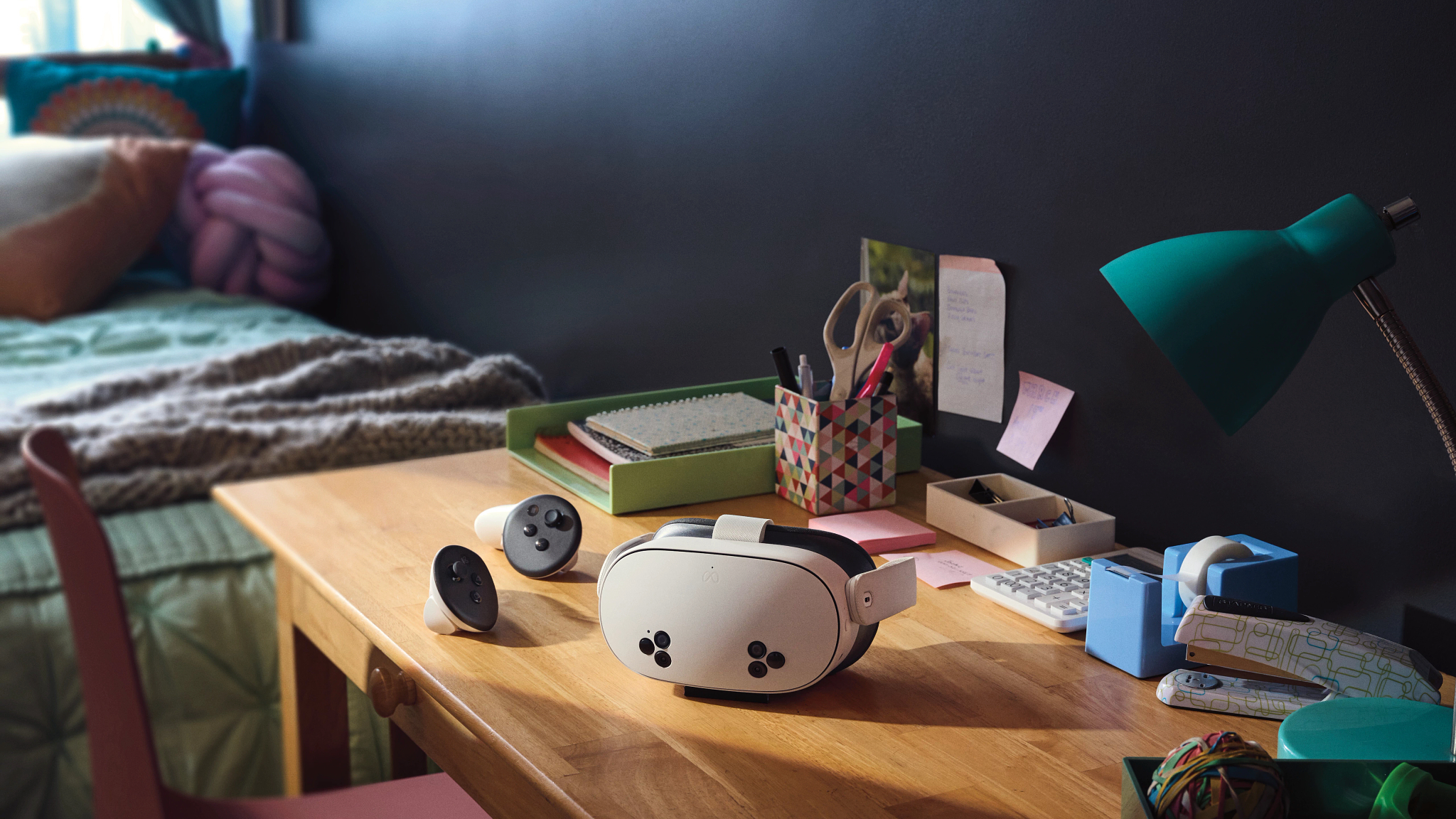
| Row 0 - Cell 0 | Meta Quest 2 | Meta Quest 3S | Meta Quest 3 |
| Compute | Snapdragon XR2 Gen 1 | Snapdragon XR2 Gen 2 | Snapdragon XR2 Gen 2 |
| RAM | 6GB | 8GB | 8GB |
| Display (per eye) | 1832 x 1920 LCD | 1832 x 1920 LCD | 2064 x 2208 LCD |
| Lens type | Fresnel | Fresnel | Pancake |
| FoV | 96-degree horizontal, 90-degree vertical | 96-degree horizontal, 90-degree vertical | 110-degree horizontal, 96-degree vertical |
| Thickness | 93.1mm | 73.9mm | 62.3mm |
| Weight | 503g | 514g | 515g |
| Mixed reality | 4ppd resolution (less than 1MP), black & white passthrough | 18ppd resolution (4MP), full-color passthrough | 18ppd resolution (4MP), full-color passthrough |
| Battery | 3640mAh (1.5-2.5 hours) | 4324mAh (2.5 hours) | 5060mAh (2.2 hours) |
Conclusion
Meta has done something truly impressive with the Quest 3S, shipping Quest 3 power in a headset that's hundreds less. It plays the same games as the more expensive Quest 3, has the same quality color mixed reality vision, and even uses the same controllers with advanced haptic feedback.
The worst part remains the lenses with their small sweet spot and hazy peripheral view. But if you can get past this, you can save $200 and still get all the same great experiences which, alone, is a mighty feat that's nearly impossible to achieve in any technology category.
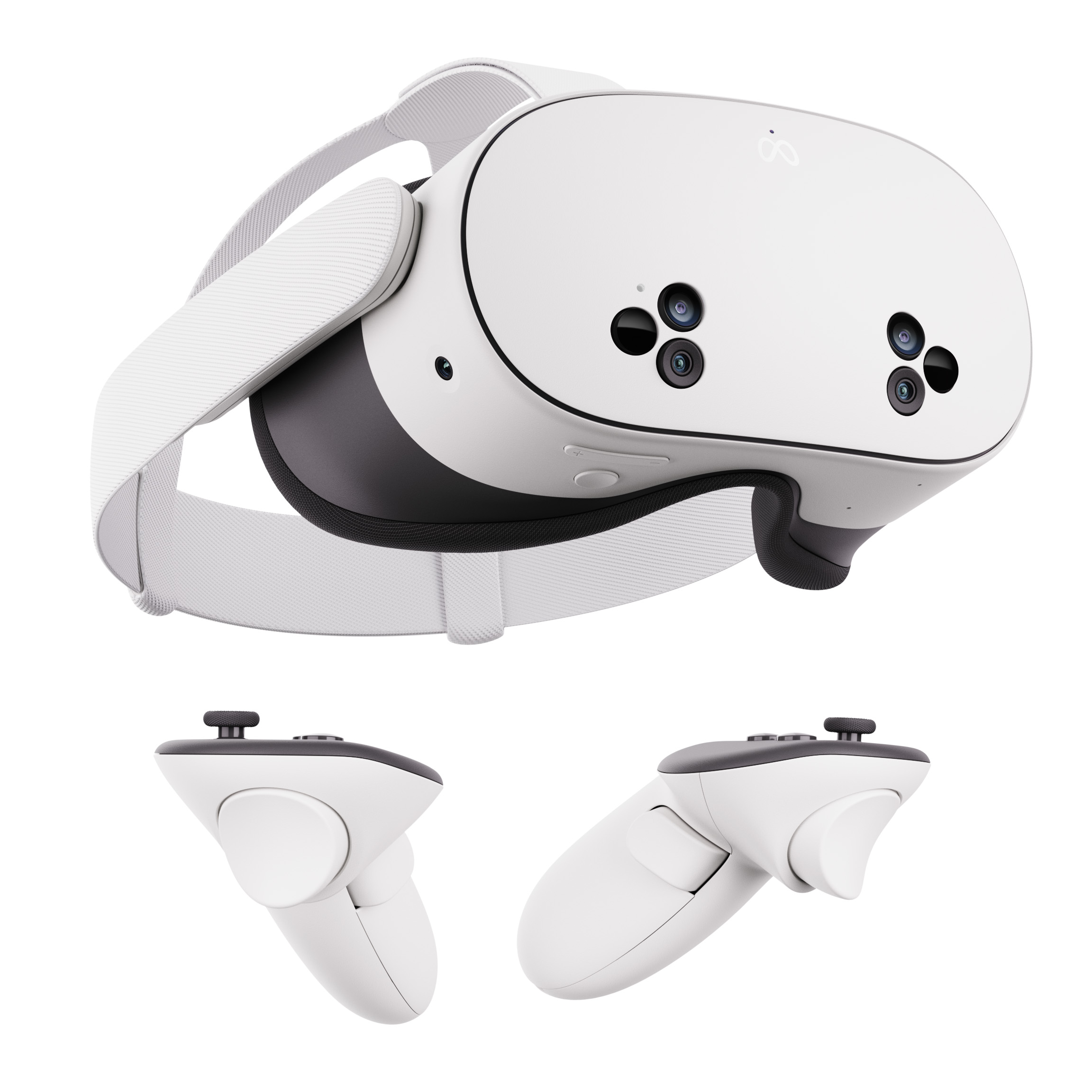
Get the best of mixed reality and virtual reality for a lot less with the Meta Quest 3S, a new, more affordable headset with the same powerful chipset and color mixed reality quality as the Meta Quest 3.

You must confirm your public display name before commenting
Please logout and then login again, you will then be prompted to enter your display name.
